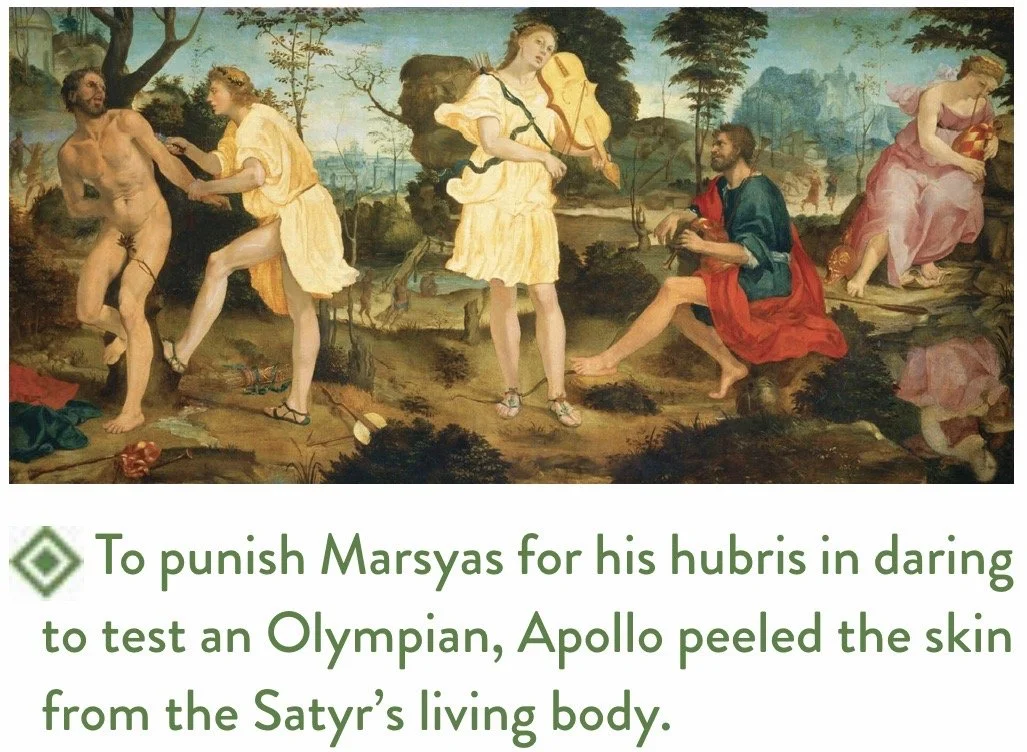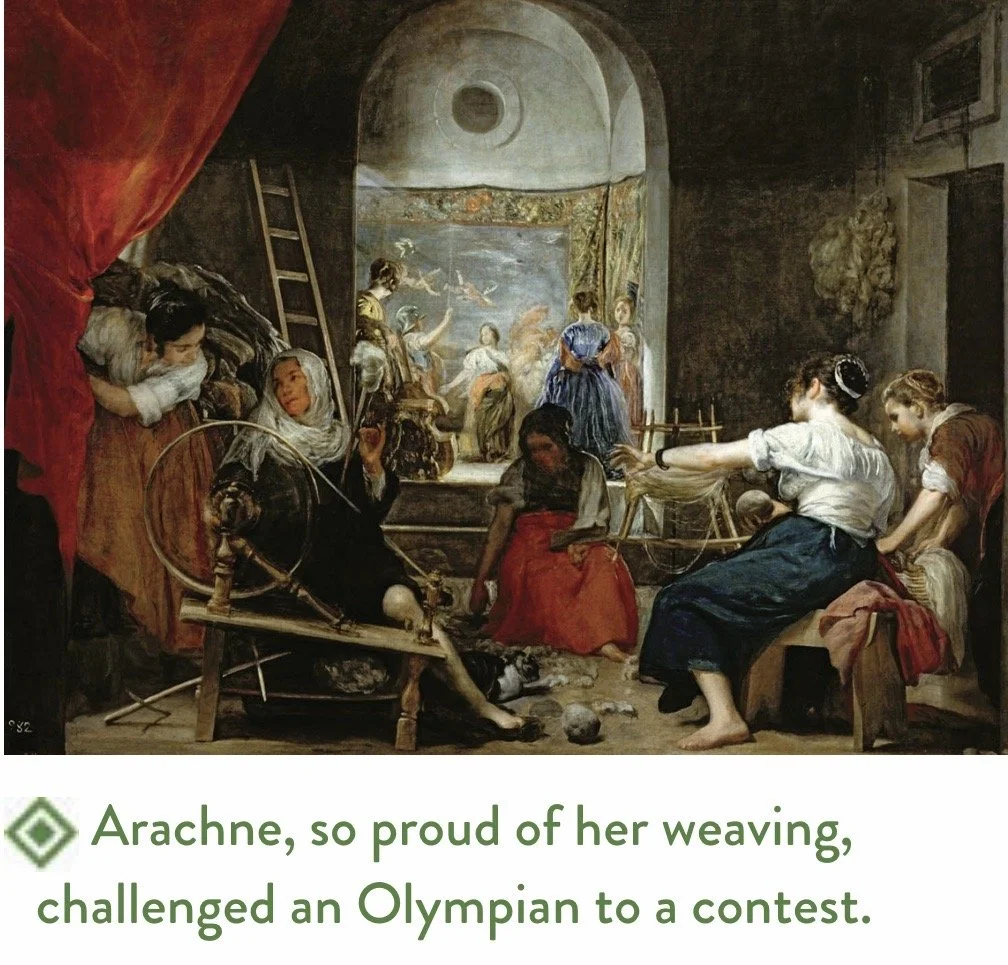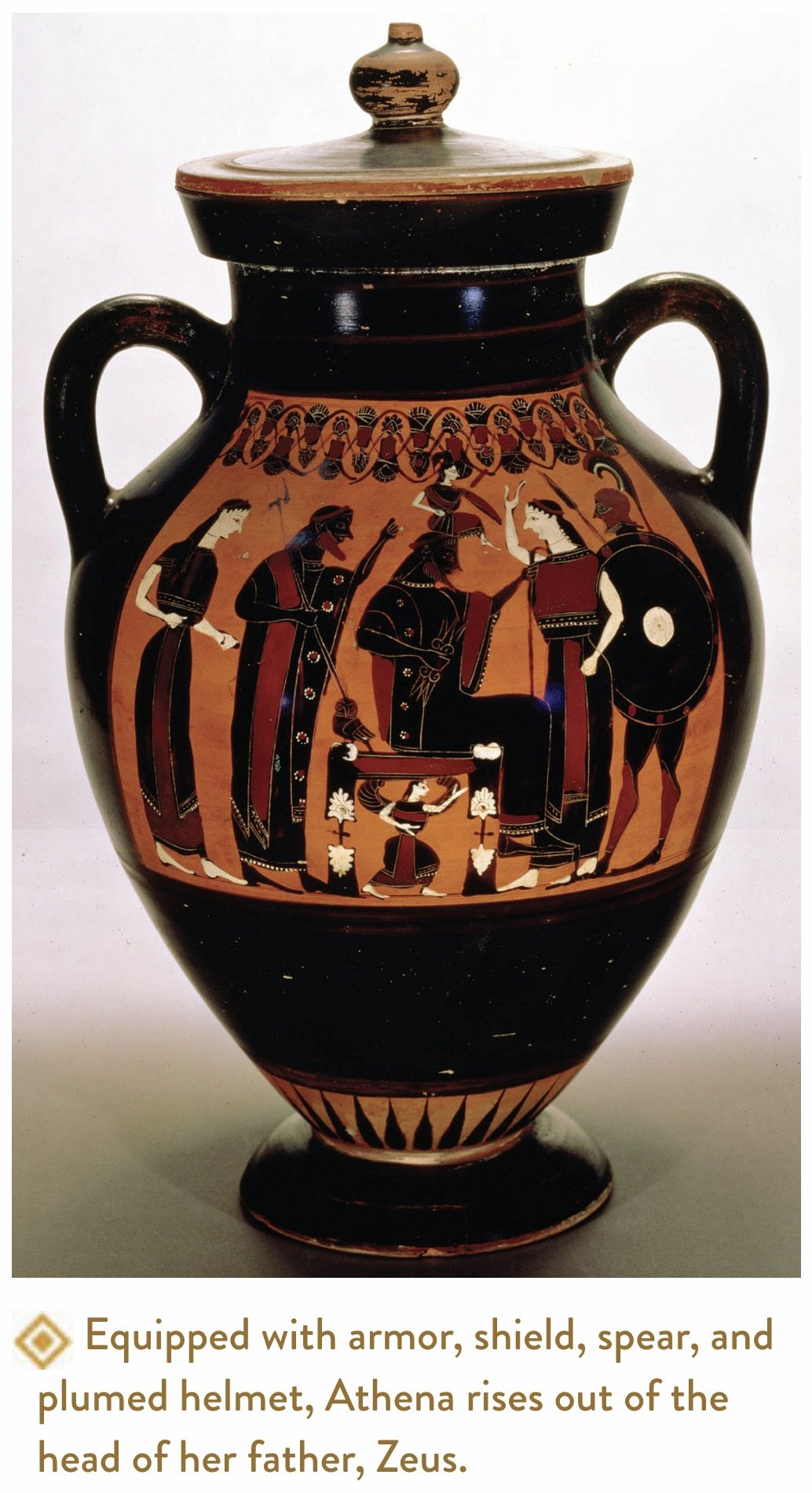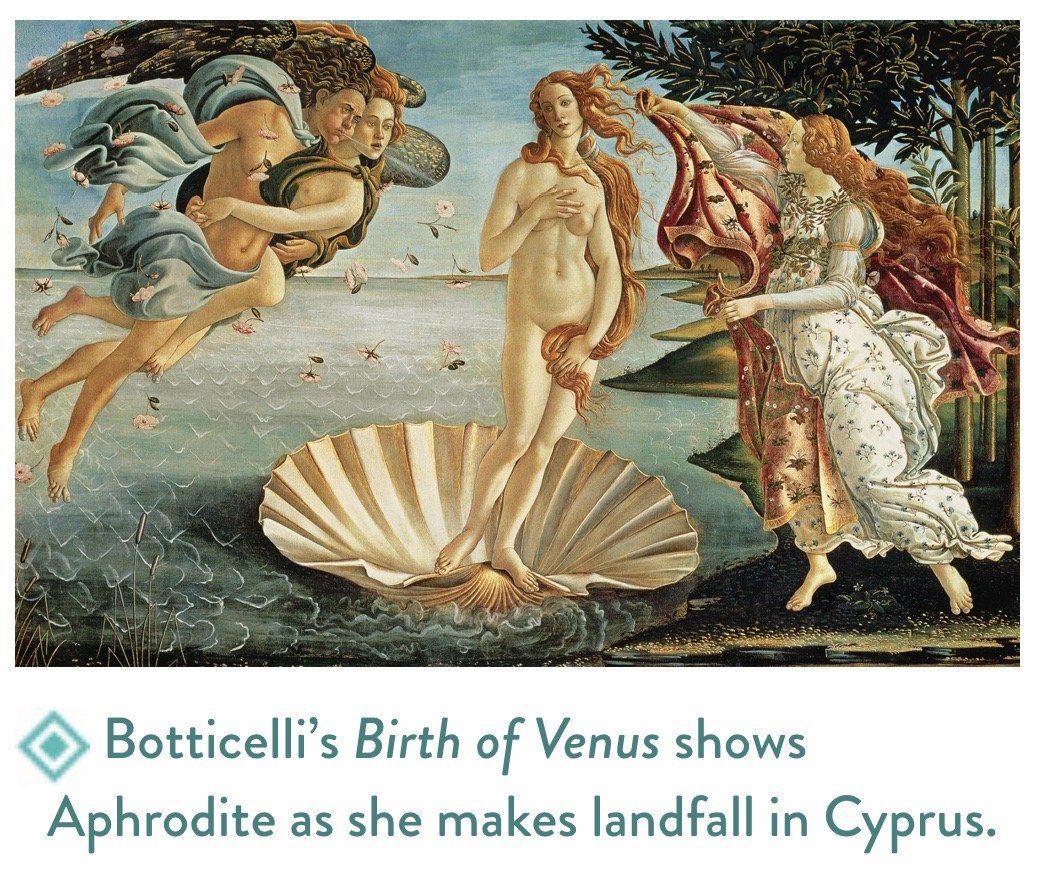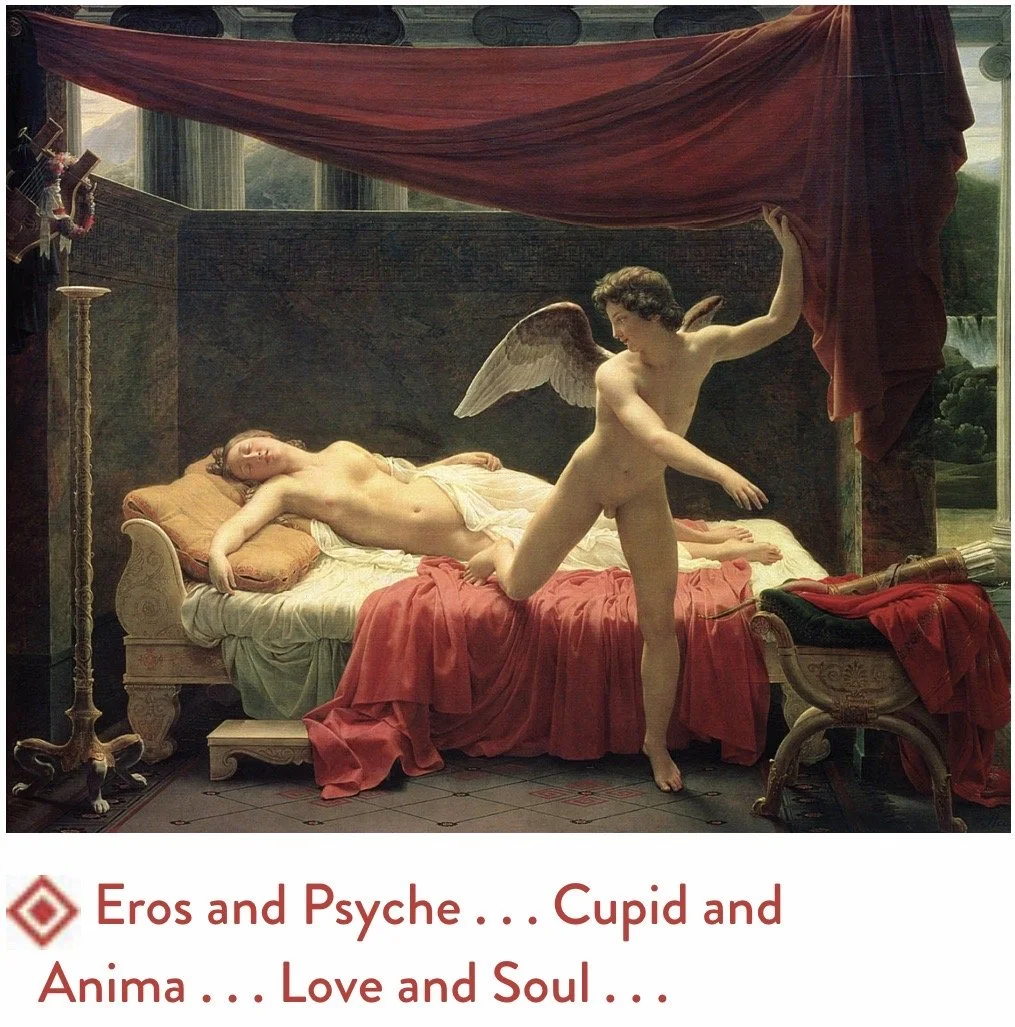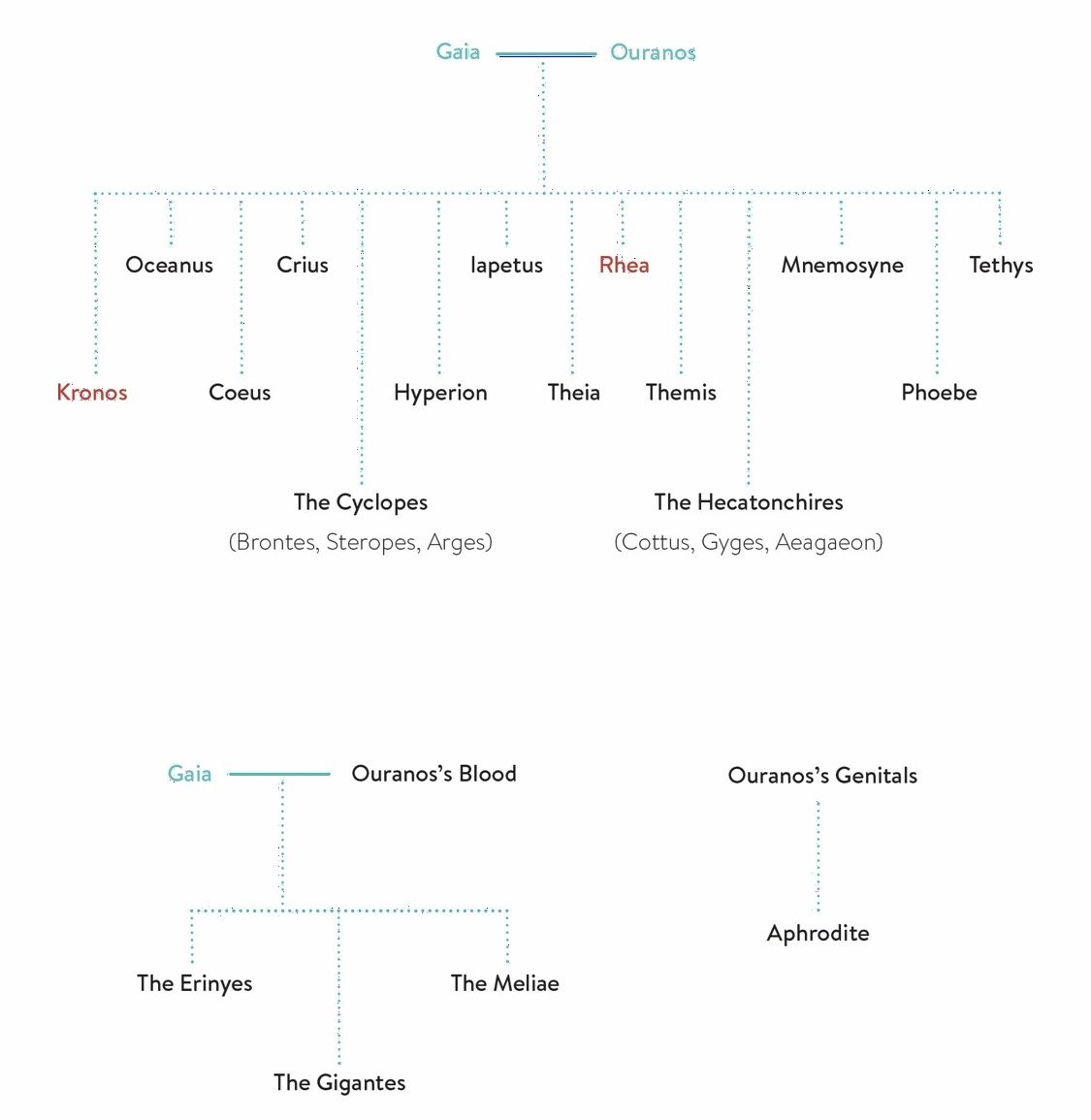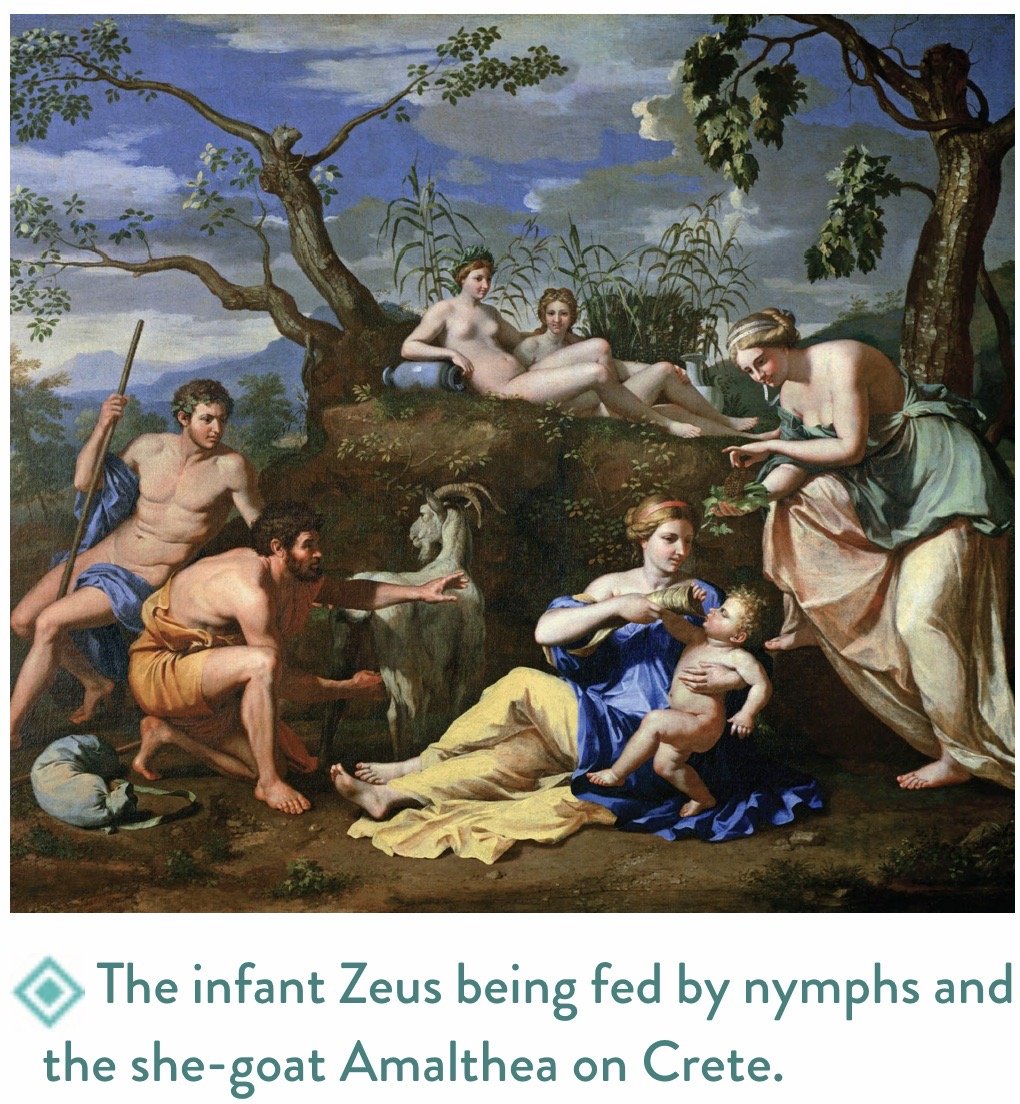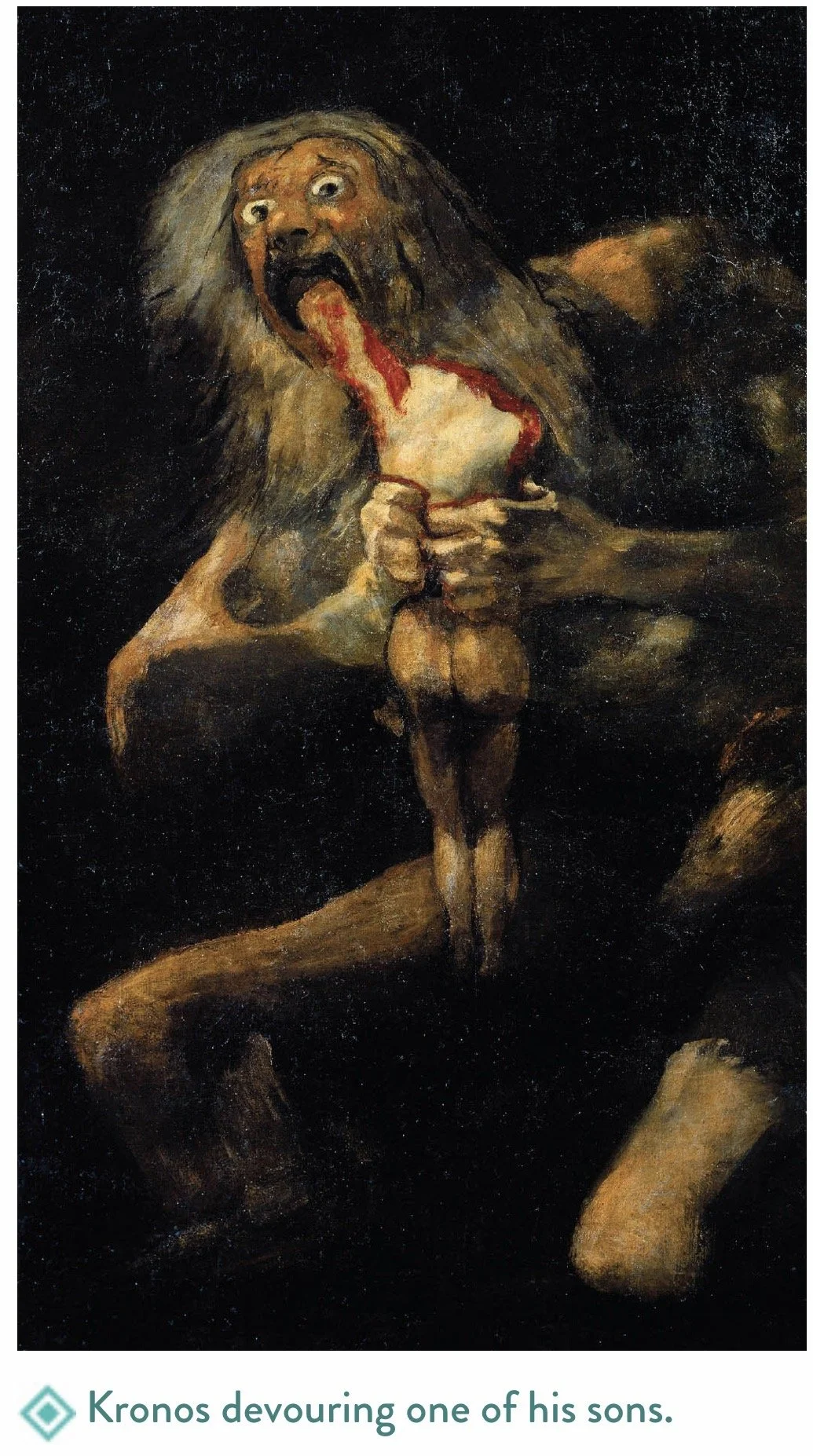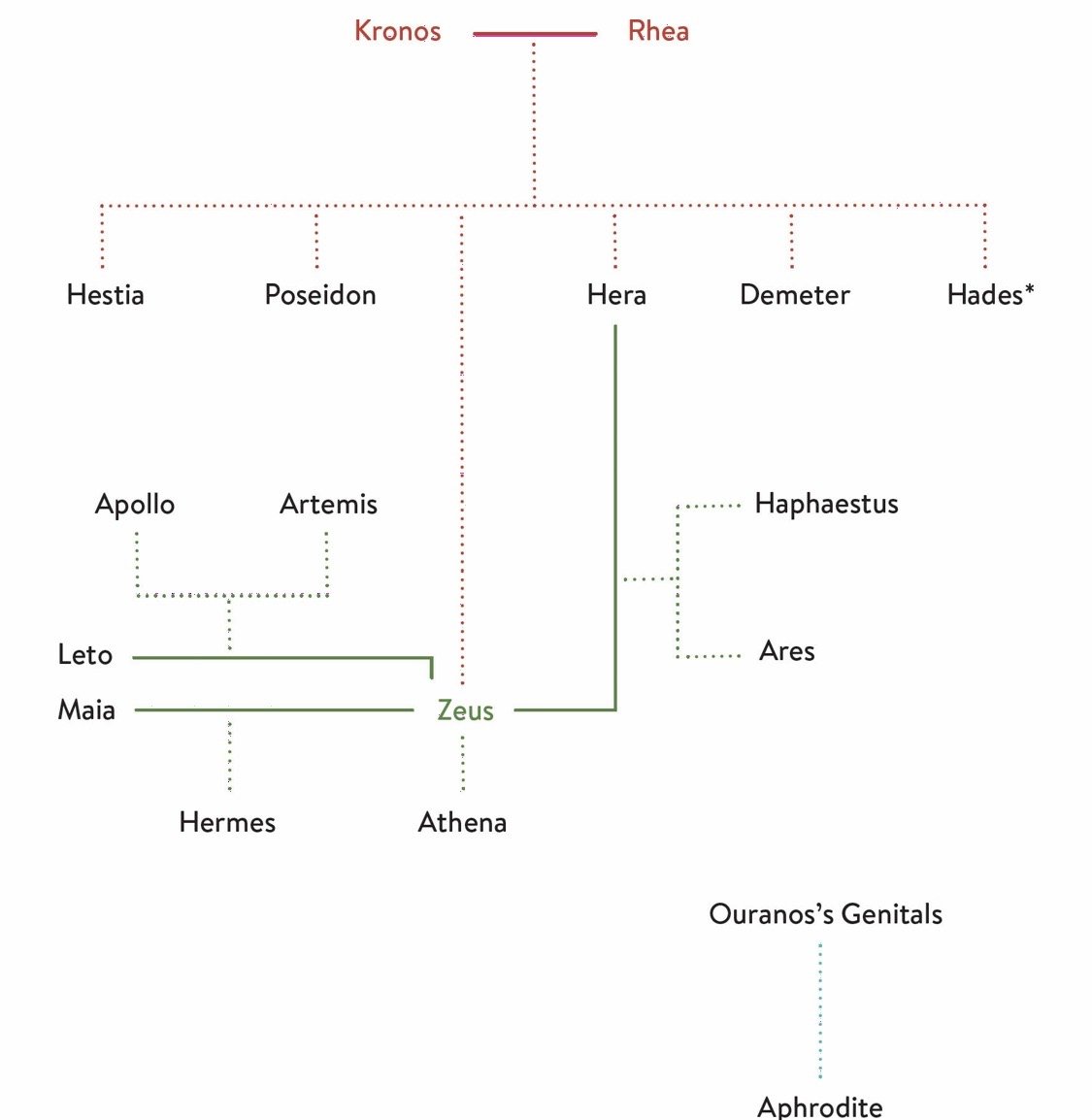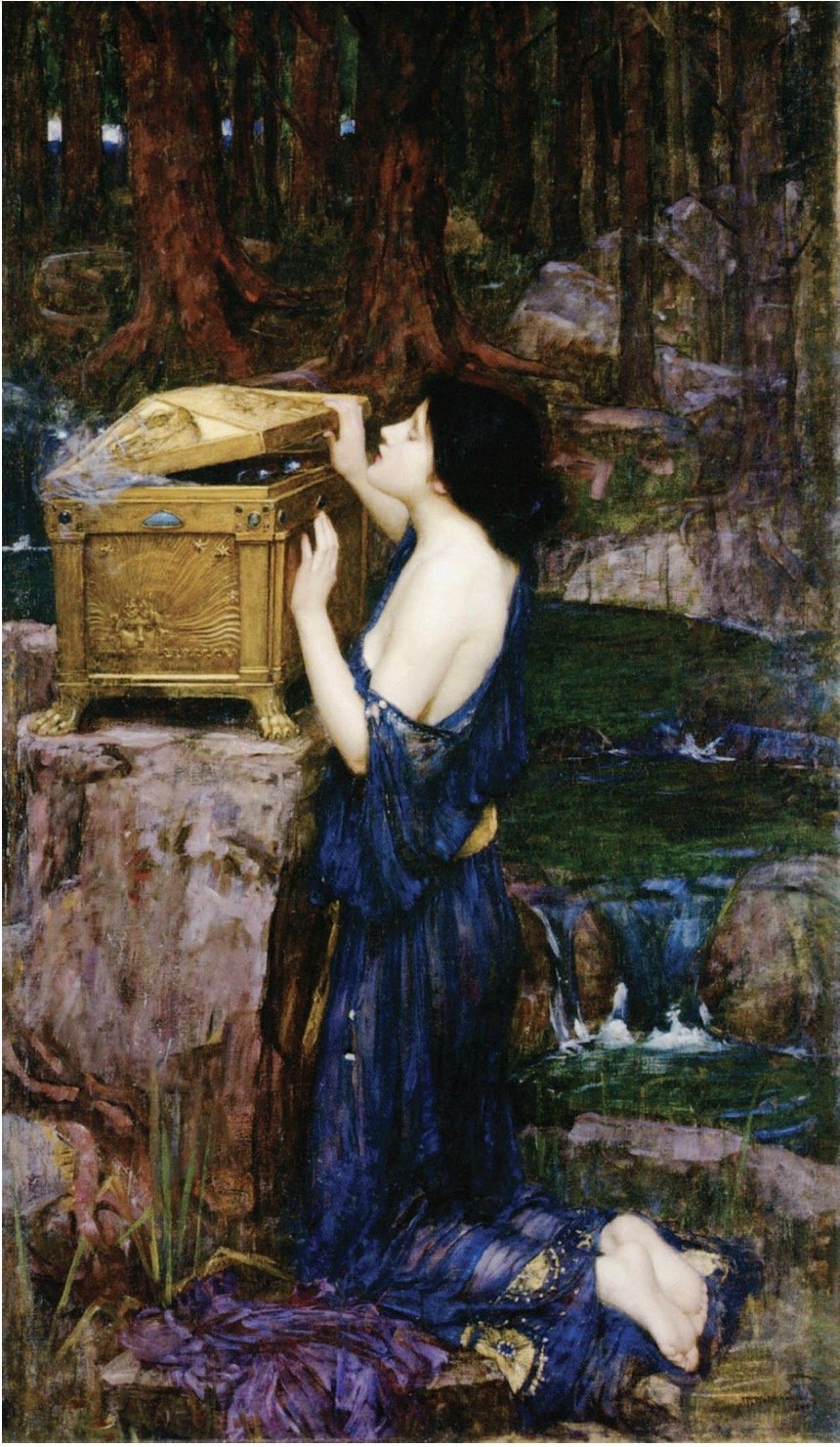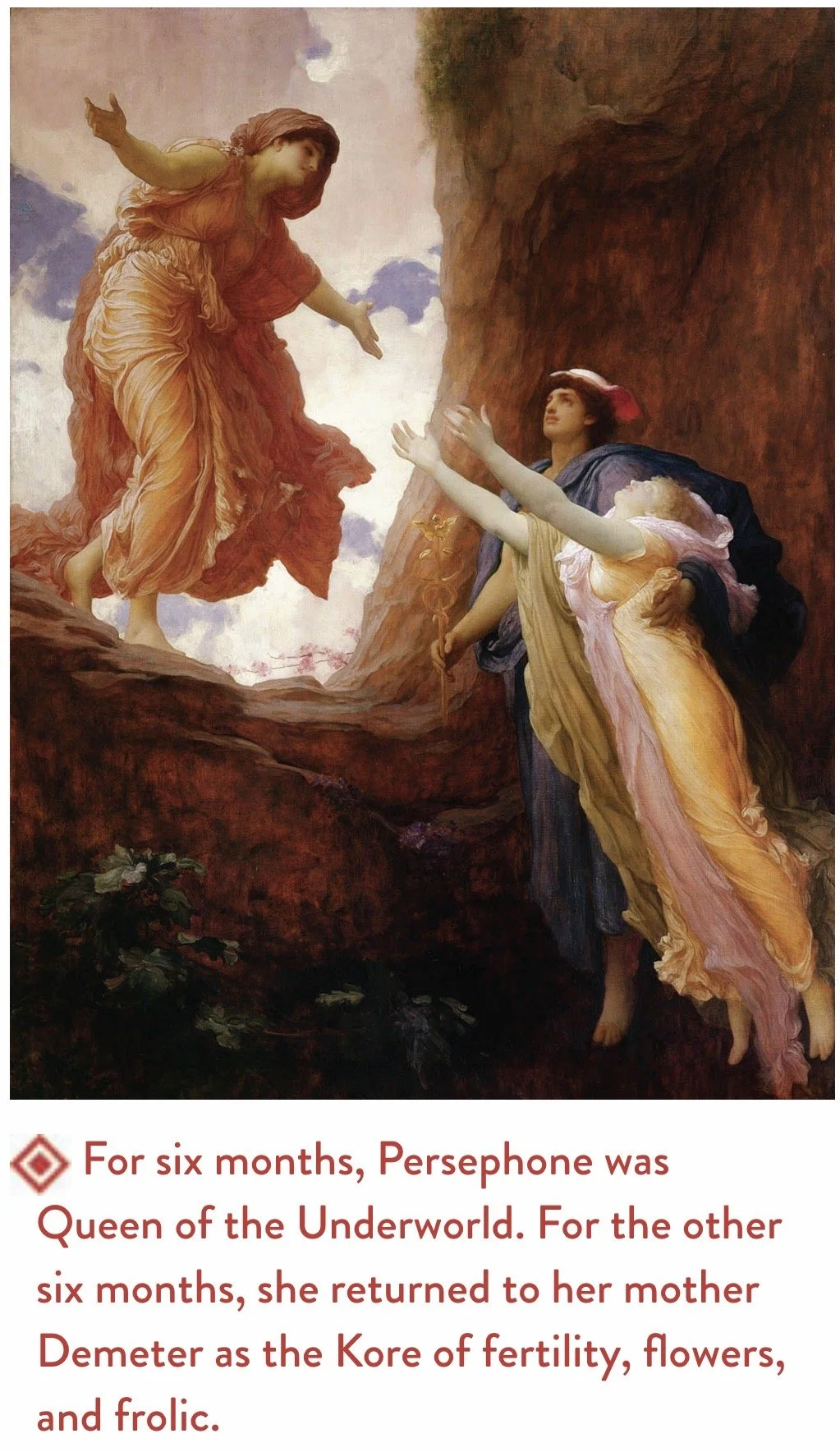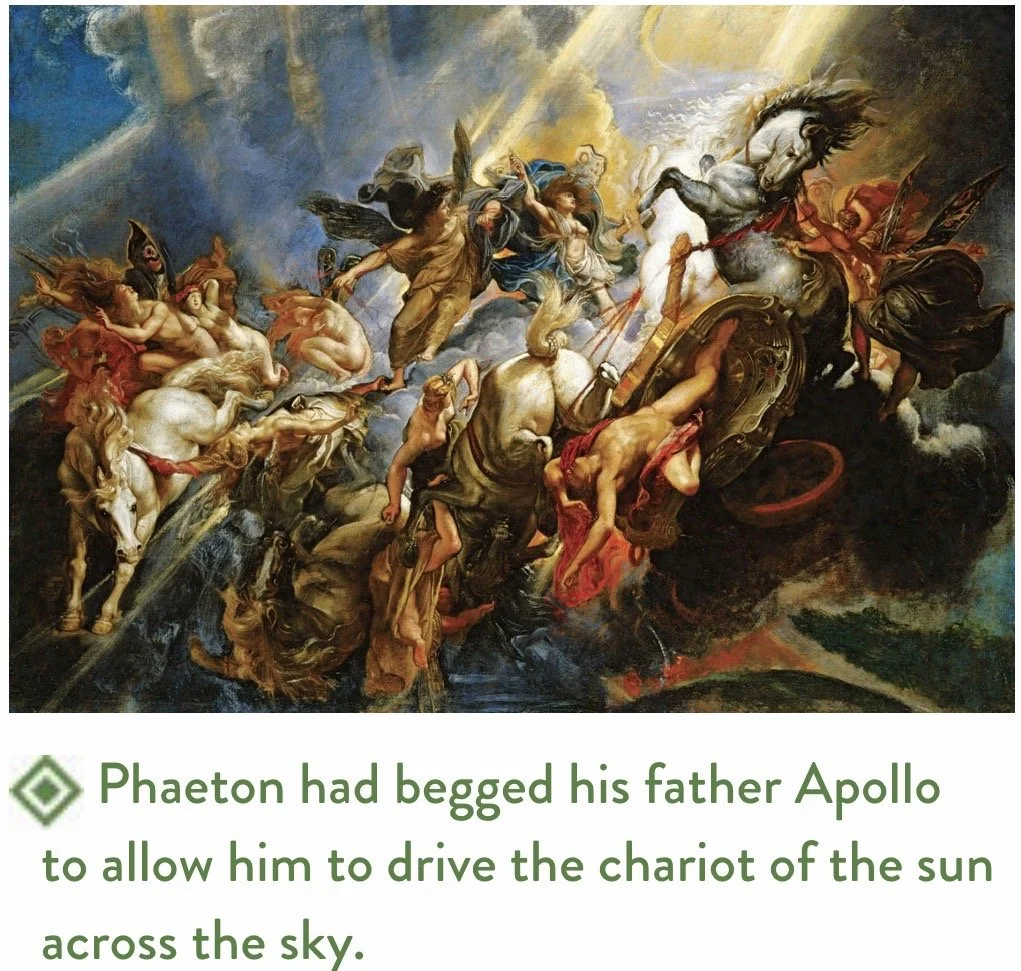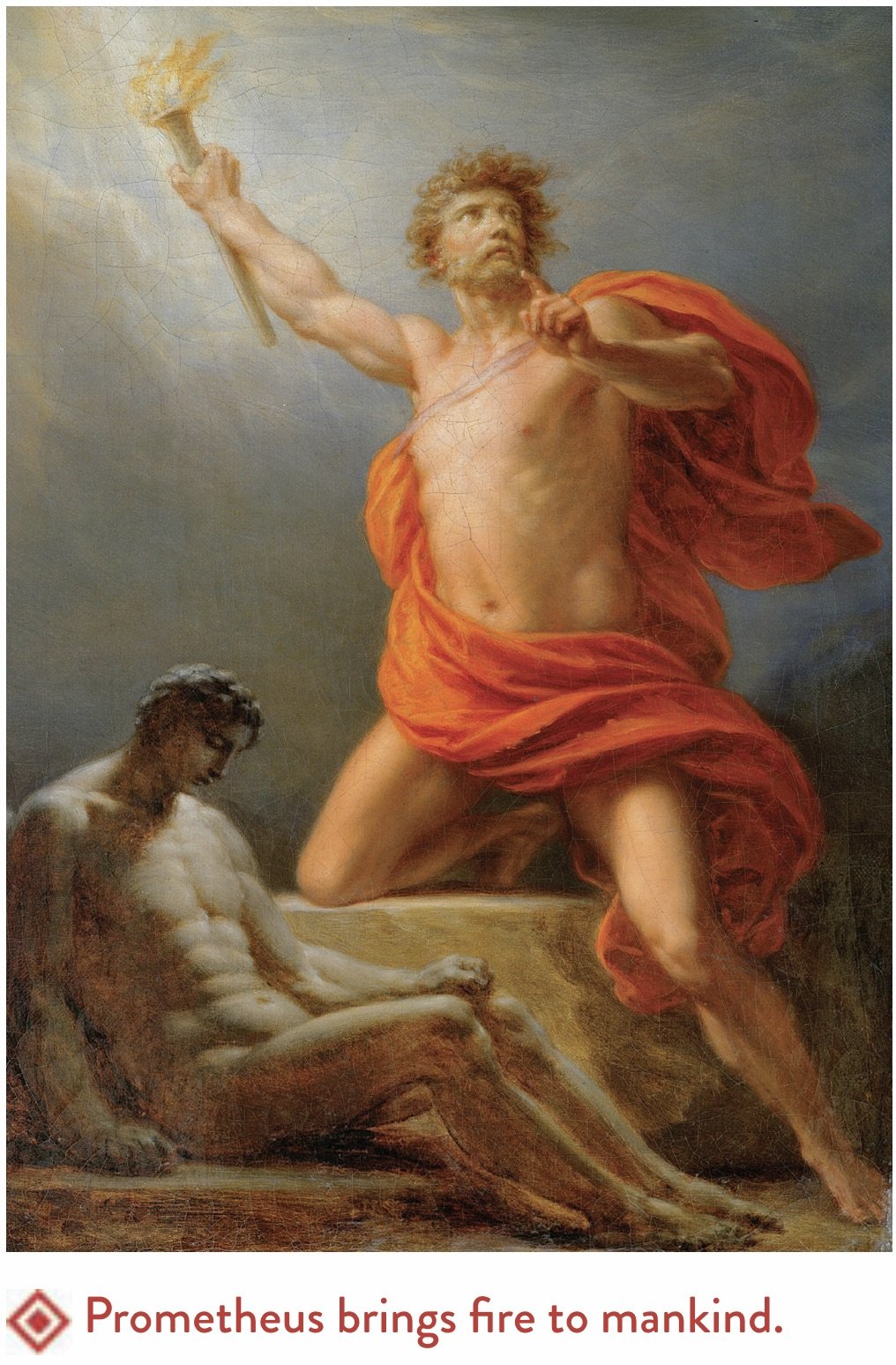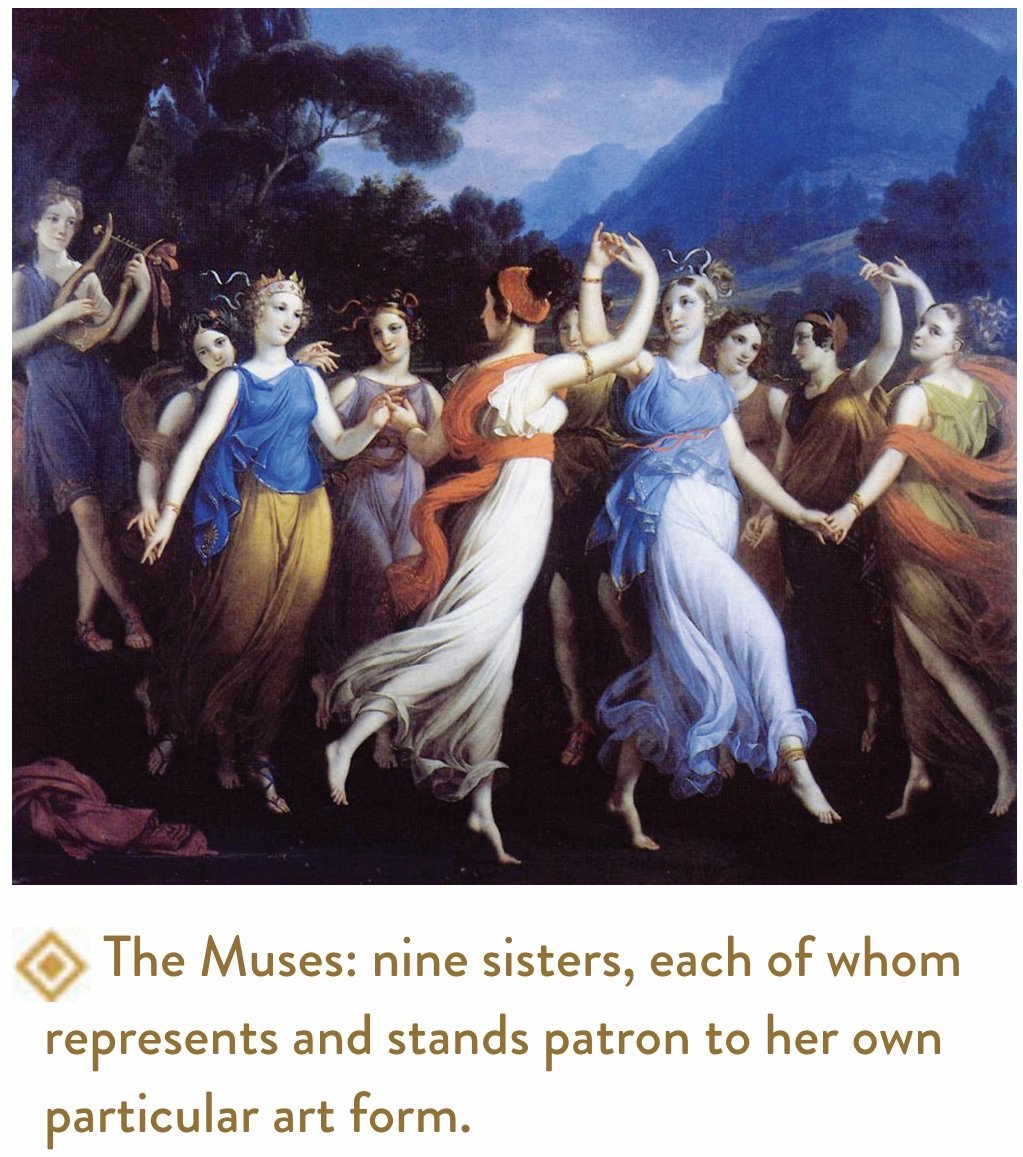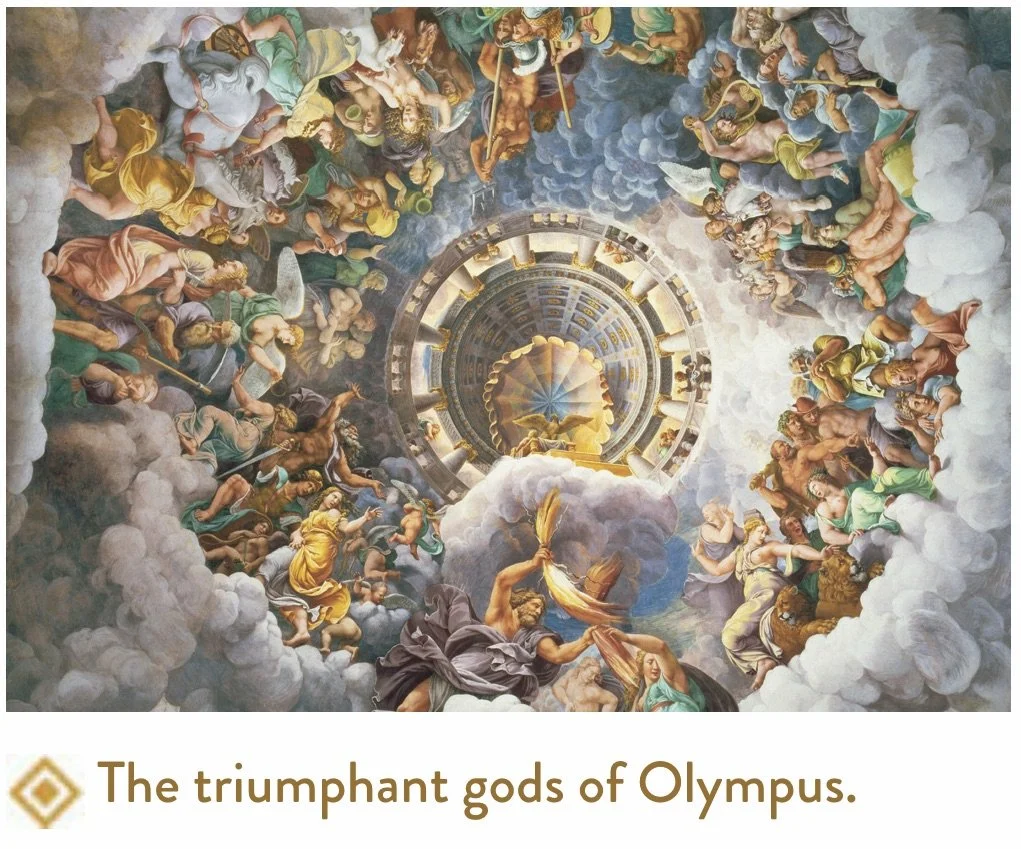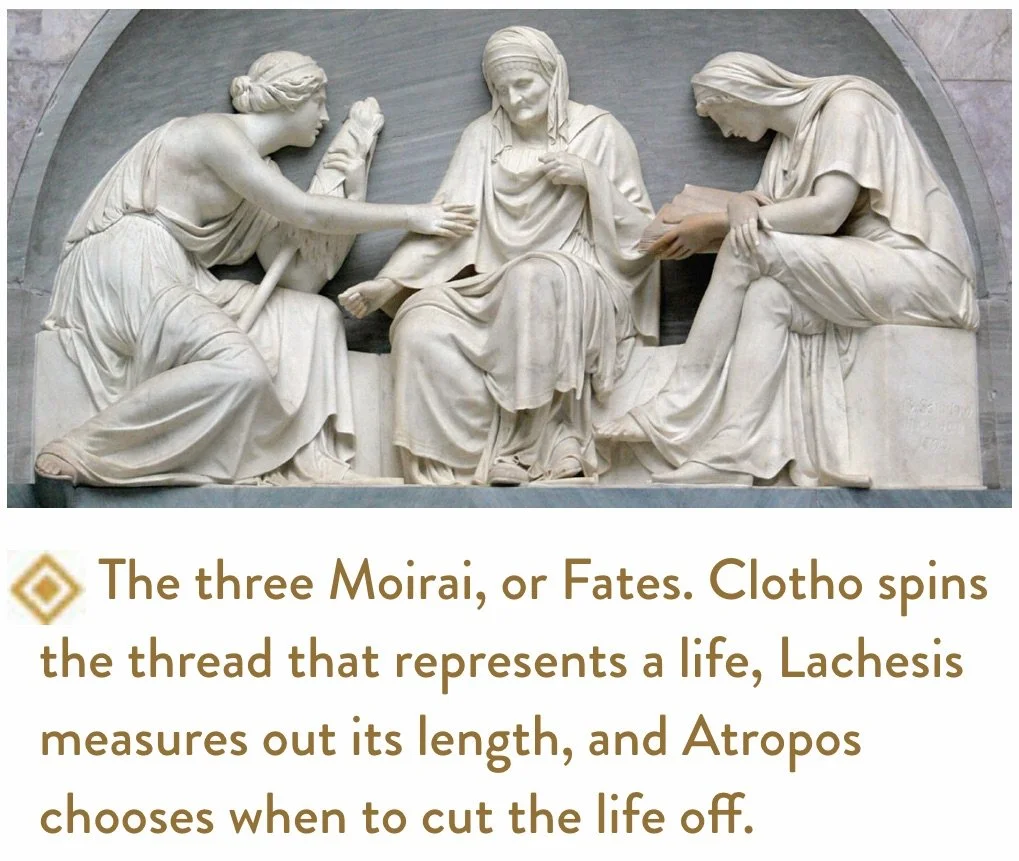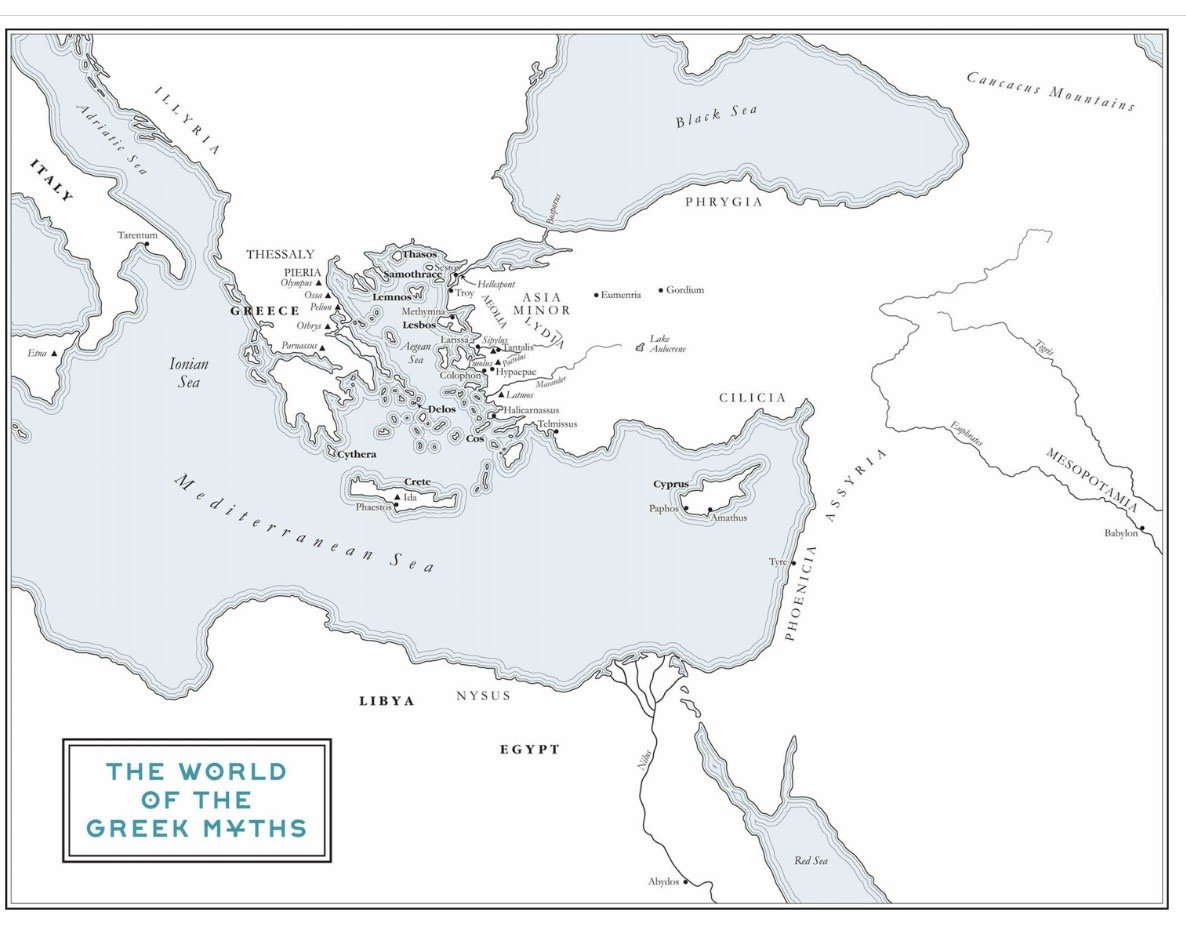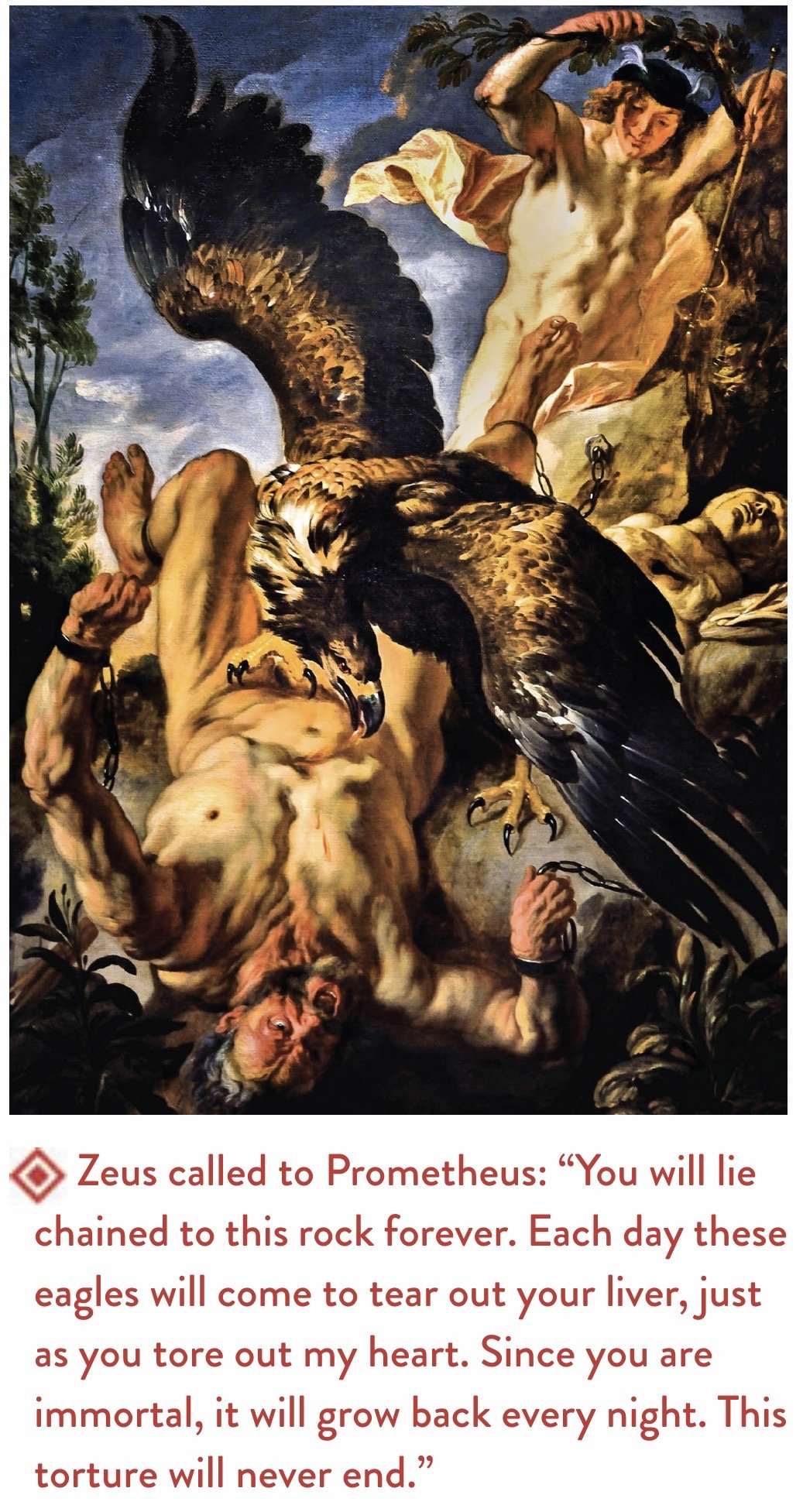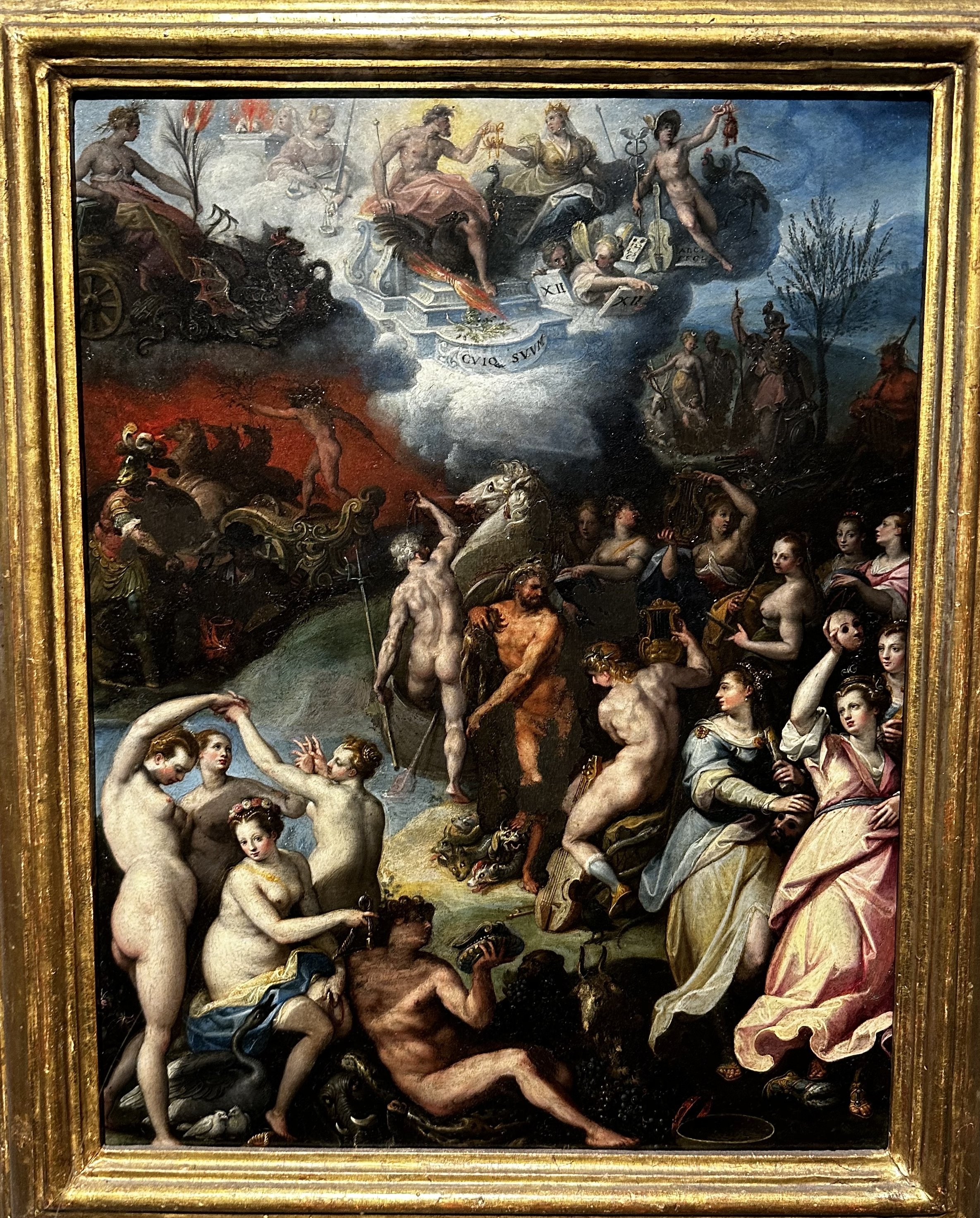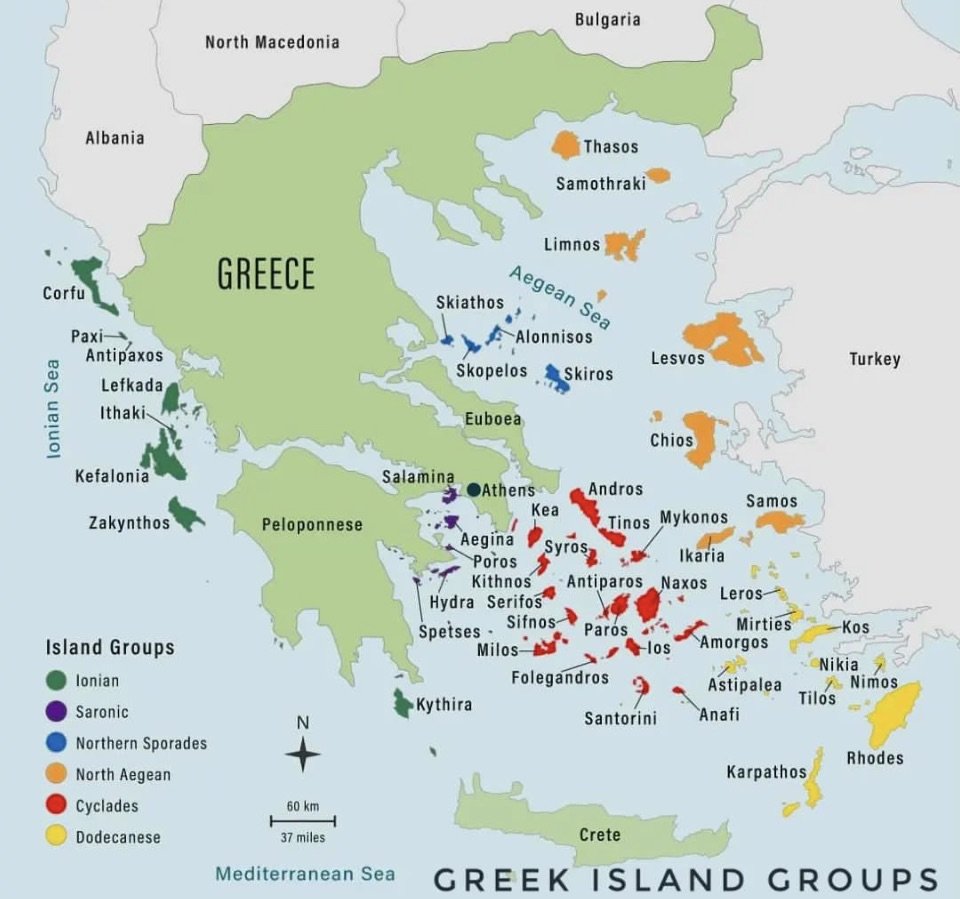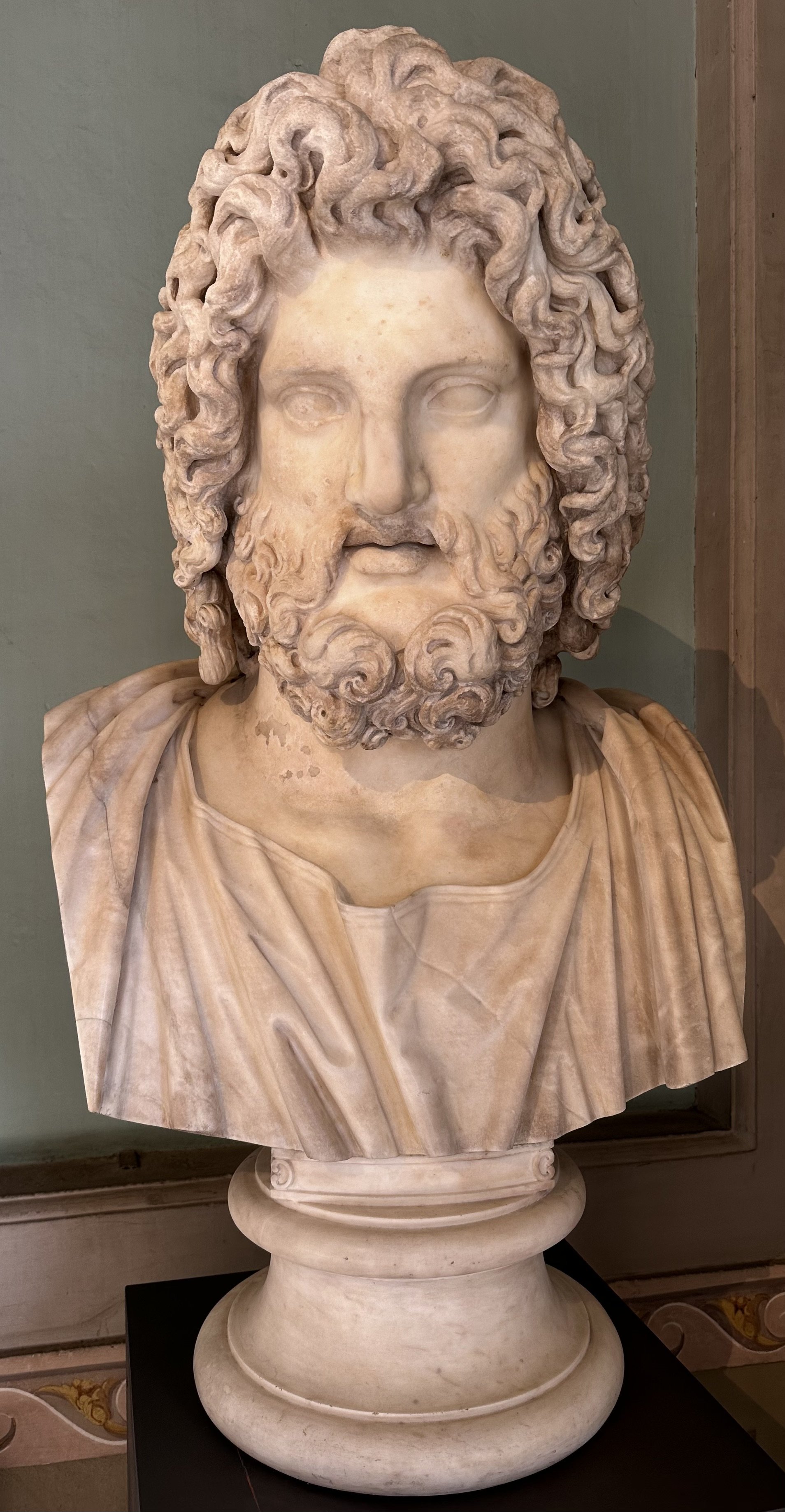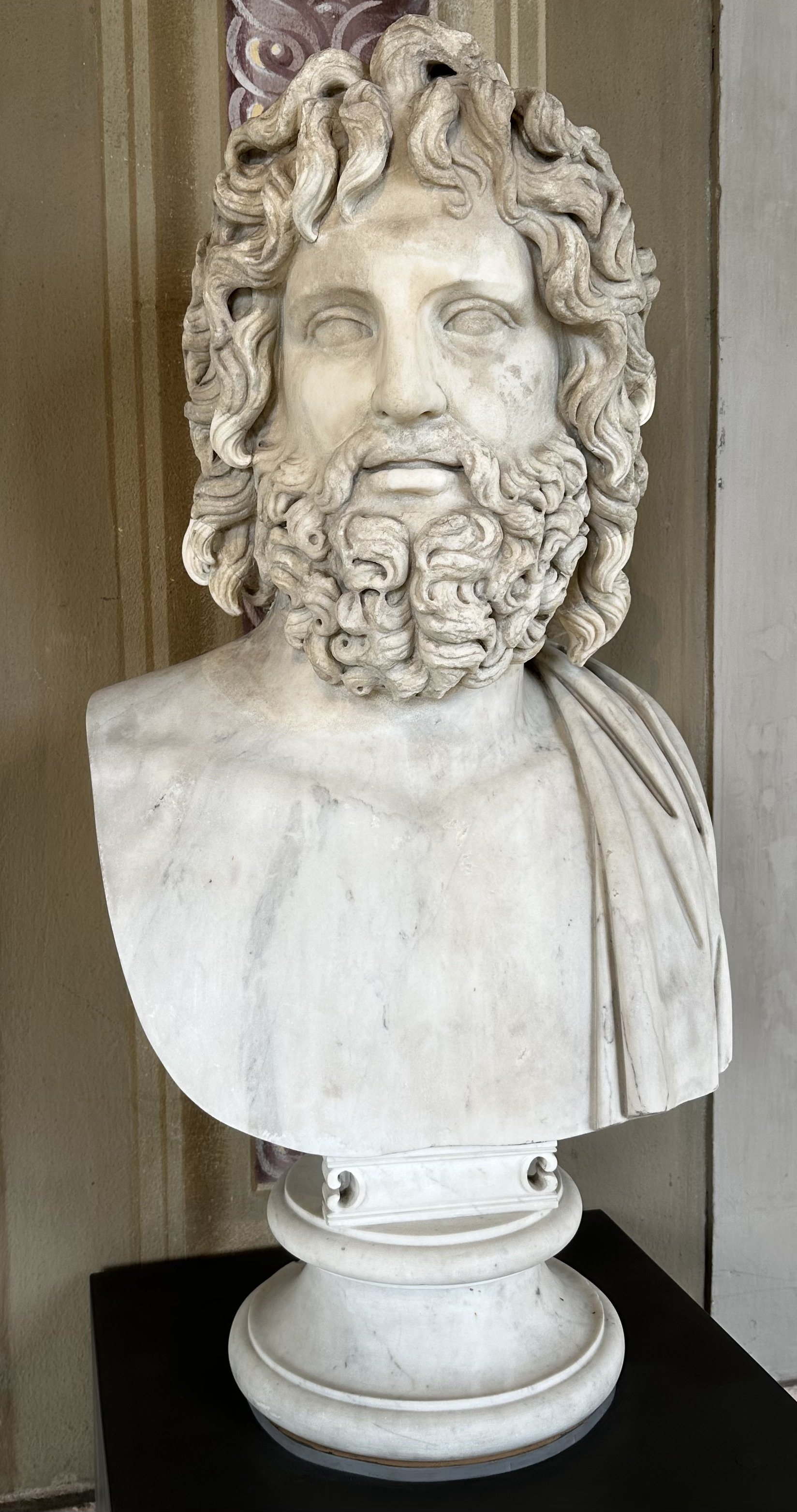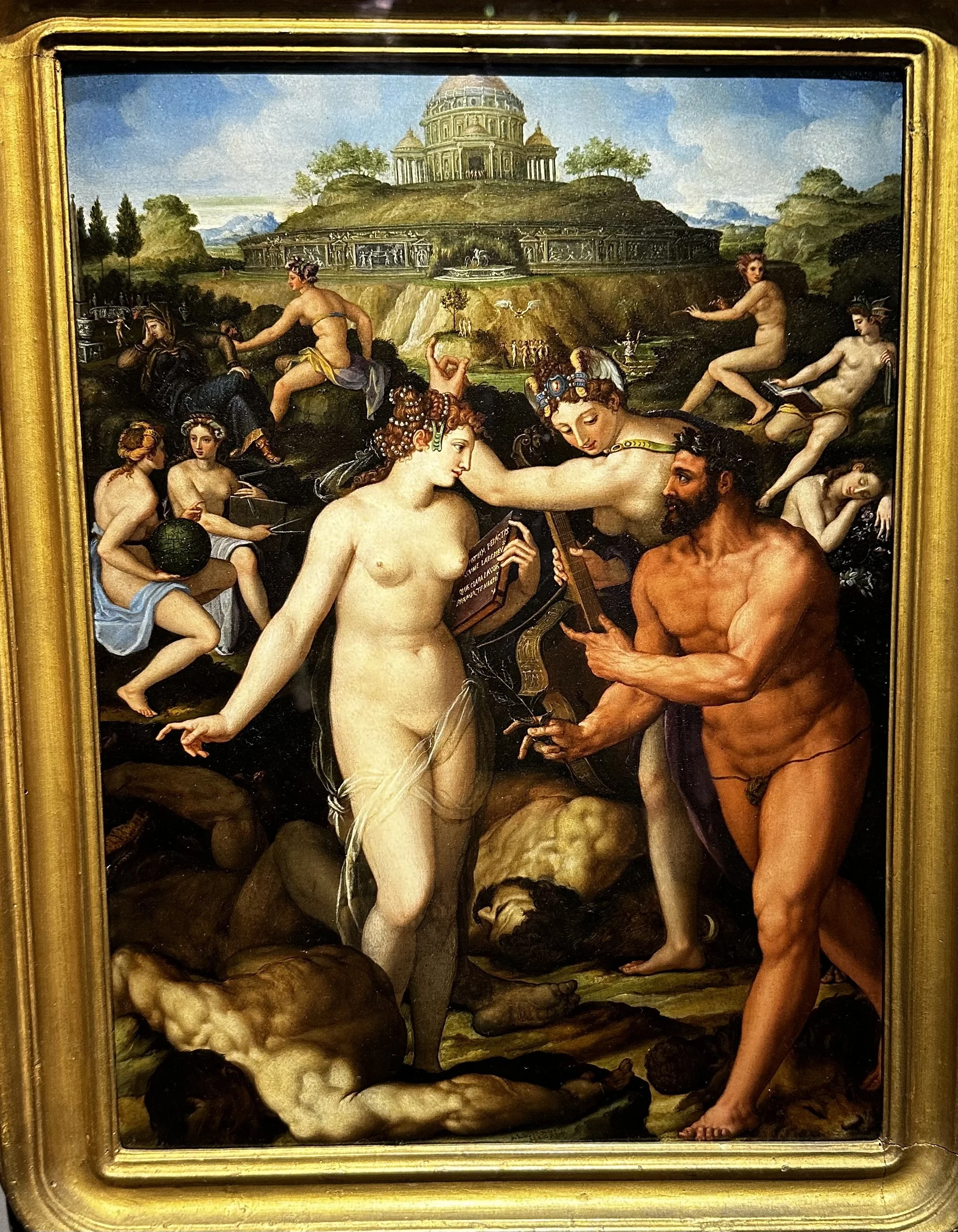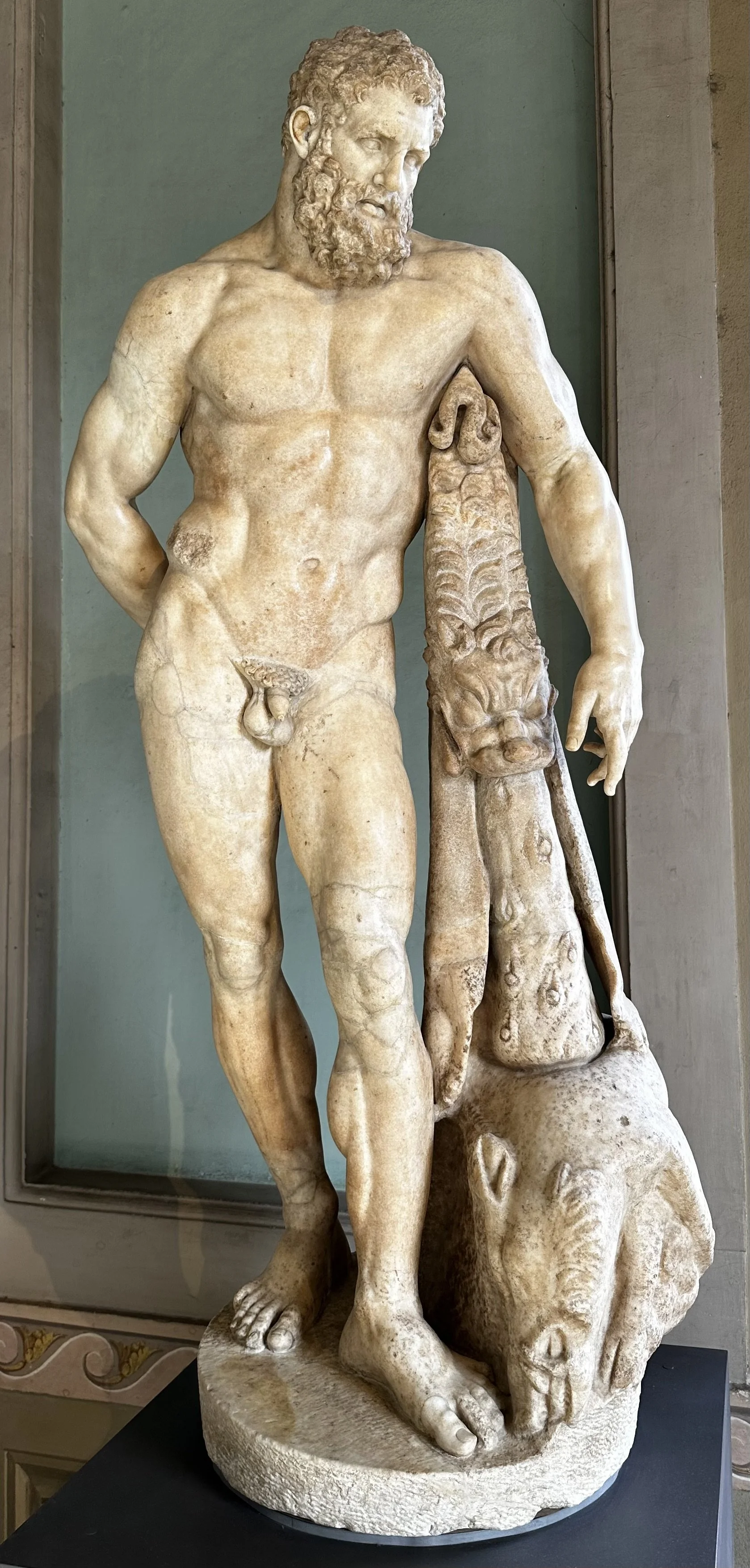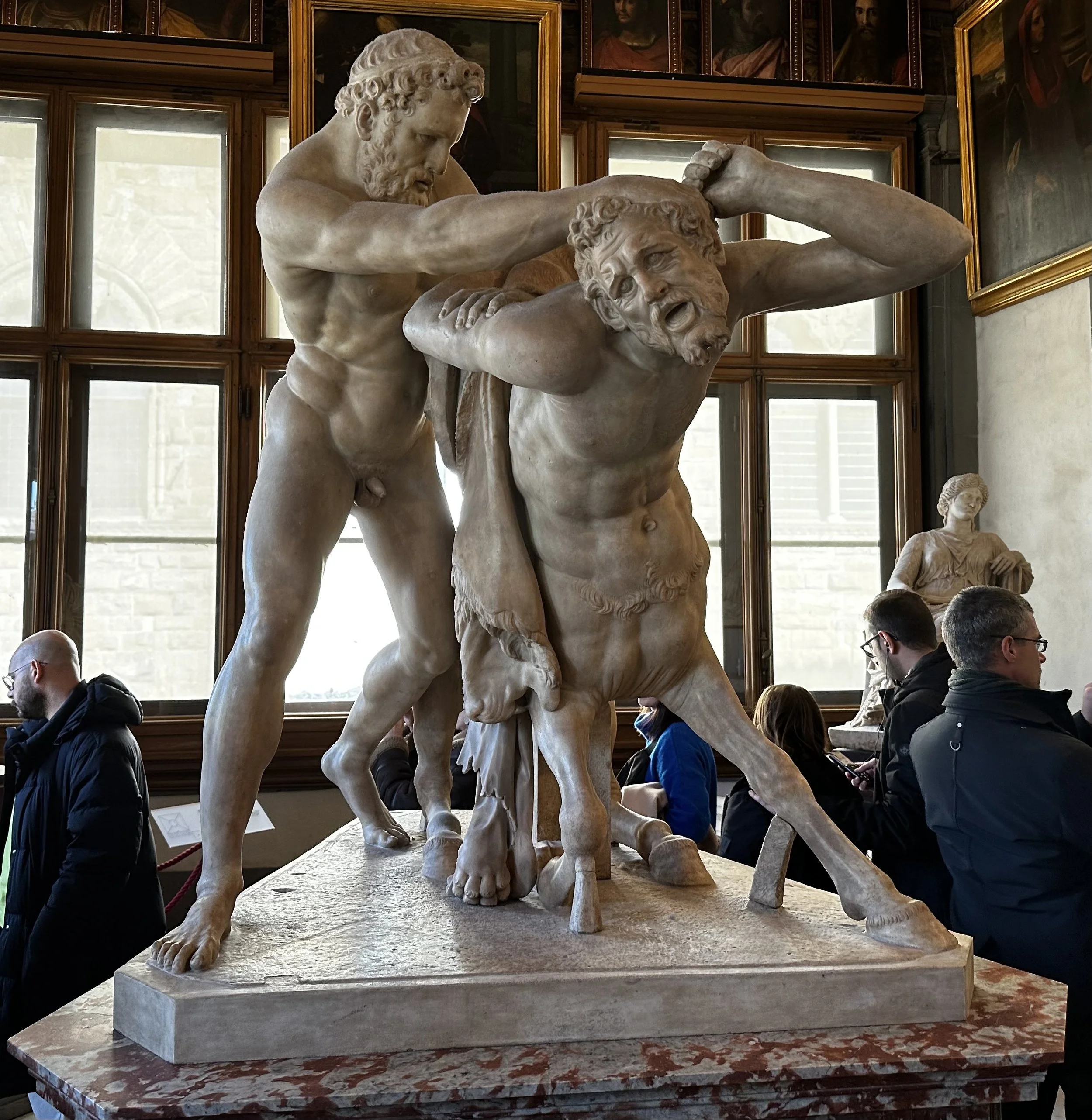Mythos by Fry
Ref: Stephen Fry (2017). Mythos: The Greek Myths Reimagined. Chronicle Books.
___________________________________________________________________________
Summary
Greek Mythology begins with Homer’s two great epic poems, the Iliad and the Odyssey, written around the 8c BCE. Their setting is the siege of Troy and its aftermath, but Homer makes countless useful references back to earlier myths. His approximate contemporary, the poet Hesiod did the most to create what might be called a timeline for Greek mythology. His Theogony (Birth of the Gods) narrates the creation, the rise of the Titans, the origin of the gods, and the establishment of Olympus. His Erga kai Hemerai (Works and Days) tells the great human creation stories of Prometheus and Pandora as well as laying out mankind’s Five Ages—Golden, Silver, Bronze, Heroic, and Iron.
At some point myth becomes cult becomes religion. It moves from stories told around the fire to a systematized set of beliefs to which obedience is owed. Priestly castes arose who ordained how people should behave and how myths become codified into scriptures, liturgies, and theologies.
The Greeks created gods that were in their image: warlike but creative, wise but ferocious, loving but jealous, tender but brutal, compassionate but vengeful.
___________________________________________________________________________
Greek Mythology
Chaos: The 'nothing' that was the initial universe. Out of Chaos sprang Erebus, Nyx, Gaia, and Tartarus
Erebus: Darkness.
Nyx: Night; gave birth to Moros, Doom and with Erebus- Hemera, & Aether.
Moros: Fate.
Doom: The most feared being in all of creation.
Hemera: Day; child of Erebus & Nyx.
Aether: Light; child of Erebus & Nyx.
Thalassa: Child of Hemera & Aether; the female counterpart of Pontus, the Sea.
Tartarus: Depths and Caves beneath the Earth.
Gaia: Earth; bore two sons- Pontus & Ouranos (Uranus). Later shortened to Ge (geology, geography, etc.).
Pontus: Sea.
Ouranos: Sky.
Gaia & Ouranos: Together, conceived the Titans and two distinct sets of triplets, the Cyclopes (1 eyed giants) and the Hecatonchires.
___________________________________________________________________________
The Titans
Titans: ‘Striving, straining ones’; six brothers and six sisters, conceived by Gaia and Ouranos. Made Othrys their home.
Oceanus: Titan God (and source) of the river (the river that flowed around the Earth).
Coeus: Titan god of the inquisitive mind (‘query’, ‘questioning’, ‘intelligence’).
Crius: Titan god of the constellations. Father of the wind god Astraeus and the warlike brothers Pallas and Perses.
Hyperion: Titan god of heavenly light. Father (with Theia) of the lights of heaven- Helios, Selene, Eos.
Iapetus: Titan god of mortality. Father of Atlas.
Atlas: Son of Titan Iapetus; the most ferocious champion of the titans, rousing his fellow Titans into combat. As punishment, Zeus sentenced him to hold up the sky for eternity.
Pleiades (‘Seven Sisters’): The Seven daughters of Atlas and the Oceanid Pleione.
Kronos: King of the Titans and God of time.
Theia: Titaness God of ‘Sight’, ‘Prophecy.’ With Hyperion, gave birth to three kids; Helios, Selene, Eos.
Helios: Sun; son of Titans Theia and Hyperion.
Selene: Moon; daughter of Titans Theia and Hyperion.
Eos: Dawn; daughter of Titans Theia and Hyperion.
Rhea: Queen of the Titans and God of fertility, motherhood, and generation.
Themis: Titaness God of justice, wisdom, good counsel; interpreter of the gods’ will.
Mnemosyne: Titaness God of memory (mnemonic). With Zeus, gave birth to 9 Daughters ‘the Muses.’
9 Muses: Highly intelligent and creative daughters who lived on Mount Helicon, Mount Parnassus above Delphi, and in Pieria in Thessaly, where the Pierian Spring, the metaphorical source of all the arts and sciences, flowed.
Euterpe: Muse of music and lyrical poetry, always shown with an aulos (flute).
Calliope: Muse of epic poetry. Her implement was the writing tablet.
Clio: Muse of History, always holding a scroll.
Thalia: Must of comedy and pastoral poetry, associated with the comic mask.
Melpomene: Must of tragedy, associated with the tragic mask.
Terpsichore: Muse of dance, associated with the lyre.
Erato: Muse of love poetry, had a type of lyre called the cithara.
Polyhymnia: Muse of sacred poetry, depicted with a veil.
Urania: Muse of astronomy, depicted with a globe and compass.
Phoebe: Titaness God of Intellect; wife of Titan god Coeus.
Leto: Goddess and mother, with Zeus, of Apollo and Artemis. Daughter of Titans Coeus and Phoebe.
Tethys: Titaness God of freshwater; wife of Oceanus.
___________________________________________________________________________
Cyclopes & Hecatonchires
Cyclopes: ‘1-eyed giants’, conceived as a set of triplets by Gaia & Ouranos. Forgers of Zeus’ thunderbolts.
Brontes: Thunder; child of Gaia & Ouranos.
Steropes: Lightning; child of Gaia & Ouranos.
Arges: Brightnes; child of Gaia & Ouranos.
Hecatonchires
Cottus: ‘The Furious’; child of Gaia & Ouranos.
Gyges: ‘The Long-Limbed’; child of Gaia & Ouranos.
Aegaeon: ‘The Sea Goat’; child of Gaia & Ouranos.
Ouranos was so disgusted by the sight of the Cyclopes and the Hecatonchires that he pushed them back into Gaia’s womb. Gaia grew to despise Ouranos and sought assistance from her titan son Kronos, gifting him an enormous scythe forged from adamantine (‘untamable’)- a massive aggregate of grey flint, granite, diamond, and ophiolite with a half-moon blade.
___________________________________________________________________________
Ouranos & Kronos
Kronos uses the scythe to castrate Ouranos. Living beings emerged from the great pools of blood flowing from the ruined groin of Ouranos, including Erinyes (‘Furies’) and the Gigantes (‘Giants’).
Erinyes: ‘The Furies’.
Alecto: Remorseless.
Megaera: Jealous Rage.
Tsiphone: Vengeance.
Gigantes (giant, giga, gigantic)
A second swing of the scythe by Kronos released the Cyclopes and the Hecatonchires from Gaia.
Aphrodite (Venus- Roman): Goddess of sexual love and beauty. Arose ‘from the foam’ at the spot near Cyprus where the Penis of Ouranos landed after flying far through the air.
Ouranos escaped into the Earth after telling Kronos that his kids would destroy him. Brooding, simmering, and raging in the ground, deep beneath the earth that once loved him, Ouranos compressed all his fury and divine energy into the very rock itself (uranium).
___________________________________________________________________________
Kronos & Rhea
Kronos & Rhea: Conceive three girls- Hestia, Demeter, Hera, and two boys- Hades and Poseidon. Weary of the words of his father, Kronos swallows all five of them whole on birth.
While pregnant with her 6th child, Rhea escapes to Crete to deliver her son, Zeus, to the She-Goat and the Meliae, creating a fake Zeus doll with a magnetic ball that Kronos assumes is the child, swallowing it whole. Zeus grows up on Crete Strong and well-nourished while Rhea considers her revenge against Kronos for devouring their babies.
With the help of the Meliae, Rhea gives Kronos a compound of salt, mustard, and ipecacuanha. The emetic concoction forces Kronos to spew up all five children- Hera, Poseidon, Demeter, Hades, Hestia.
___________________________________________________________________________
Titanomachy
Titanomachy: The War between the Olympians and the Titans; a violent and destructive conflict won by the Gods.
Atlas: Son of Titan Iapetus and the most ferocious champion of the titans, rousing his fellow Titans into combat. As punishment, Zeus sentenced him to hold up the sky for eternity.
Kronos: Given the nickname “Old Father Time” and doomed by Zeus to count infinity itself.
Cyclopes: Forged the thunderbolts that Zeus uses in battle.
___________________________________________________________________________
The Olympians
The Olympians: The Gods of Olympus, ruled by Zeus and Hera as King and Queen with their home at Mt. Olympus. The 12 Gods of Mt Olympus can still be seen around us in the Zodiac, the day’s hours, in months and inches, the Tribes of Israel, Disciples of Jesus, Days of Christmas, and the Asian twelve-year cycle.
Zeus: King of the Gods and thunder; son of Titans Kronos and Rhea.
Leto: Goddess and mother, with Zeus, of Apollo and Artemis. Daughter of Titans Coeus and Phoebe.
Metis: Lived within the head of Zeus as a prudent check on the reckless excesses and headlong passions that often threatened to get the god of thunder into trouble.
Hera: Queen of the Gods; daughter of Titans Kronos and Rhea.
Poseidon: Ocean God; son of Titans Kronos and Rhea. With Hades, given a choice of the underworld (a black rock) or the oceans (a blue sapphire) by Zeus. Poseidon chooses the sapphire.
Demeter: Goddess of the Harvests, growth, fertility, and the seasons; daughter of Titans Kronos and Rhea.
Hades: God of the underworld; son of Titans Kronos and Rhea. With Poseidon, given a choice of the underworld (a black rock) or the oceans (a blue sapphire) by Zeus. Hades chooses the black rock.
Ares: God of battles, combat, fighting; son of Zeus and Hera.
Hephaestus (Vulcan- Roman): God of fire, blacksmiths, artisans, sculptors, metalworkers; son of Zeus and Hera, cast out by Hera for being ugly, but allowed to return after designing a chair that only he could get her out of.
Apollo: Sun god; son of Zeus and Leto. Established at Pytho (whose name he changed to Delphi) an oracle where anyone could come to ask the god or his appointed priestess (‘Sibyl’, or ‘Pythia’) questions about the future.
Hermes: Messenger of the Gods; son of Zeus and Maia.
Various Children (Misc Women)
Pan: Goat footed God of nature.
Dryope: Nymph.
Hermaphroditus: Daughter of Hermes & Aphrodite, named in their honor. Hermaphroditus grew up in the shadow of Mt. Ida and was cared for by Naiads. At age 15, he left to wander the world, traveling in Asia Minor, he met a naiad called Salmacis, who was splashing in the waters of a spring near Halicarnassus. Hermaphroditus, who was as shy as he was lovely, became greatly confused and unhappy when this forward creature, stunned by his beauty, tried to seduce him. The more she tried, the less comfortable the boy became, until he shouted at her to leave him alone. She departed in a sulky surge, shocked and humiliated by the new and unwelcome experience of rejection. Hermaphroditus, thinking she was safely out of the way, stripped off his clothing and plunged into the cool waters of the spring to refresh himself. Almost immediately Salmacis swam over and clung fast to his naked body. Revolted he wiggled and wriggled and jiggled to be set free, while she cried up to the heavens, “O gods above, never let this youth and me part! Let us always be one!” The gods heard her prayer and in an instant Salmacis and Hermaphroditus did indeed become one. The pair fused into a single body, now intersex, male and female coexisting in one form.
Hestia: Virgin goddess of the Hearth; daughter of Titans Kronos and Rhea.
Artemis: Goddess of the hunt, the wilderness, wild animals, nature, vegetation, childbirth, care of children; the daughter of Zeus and Leto.
Athena: Goddess of War, planning, tactics, strategy, intelligence; the daughter of Zeus who emerged as a full-grown warrior from his forehead.
The Owl of Athena: The dignified symbol of watchful wisdom; Athena & Poseidon vied for patronage of the city of Cecropia. Poseidon struck his trident producing a spring of useless seawater while Athena gave the gift of an olive tree. The citizens of Cecropia saw the manifold benefits of its fruit, oil, and wood and chose her as their deity and protector, changing the name of the city to Athens.
___________________________________________________________________________
Honey (Melia)
Zeus and Hera marry and throw the finest feast the cosmos have seen. They invite all creatures in a cook-off with the winner being granted a single wish from Zeus. Melissa the bee wins with 'honey'- the nectar of the gods, and asks Zeus for a weapon to protect herself against creatures stealing her honey. Zeus, angry at the mortal request, gives her a stinger and the assistance of a colony but tells her that using her stinger will cause her death.
___________________________________________________________________________
Humanity & Fire
Humanity: Created in the image of the Gods by Zeus. Prometheus molded humans using four elements: Earth (Gaia’s clay), Water (the spittle of Zeus), Fire (the sun of Apollo), and Air (the breath of Athena). Zeus calls them "Anthropos" (‘that which is down below’).
Women: Zeus commanded Hephaestus to do as Prometheus had done, to shape a human being from clay moistened by his spittle. But this was to be the figure of a young female. Taking his wife Aphrodite, his mother Hera, his aunt Demeter, and his sister Athena as models, Hephaestus lovingly sculpted a girl of quite marvelous beauty into whom Aphrodite then breathed life and all the arts of love.
After some time, Prometheus decides to grant humanity fire, not just any fire, but divine fire, fire from the gods, think of it as knowledge or divine wisdom.
Prometheus’s solution was to steal the arts from Athena and flame from Hephaestus. With these, man could use wisdom, wit, and industry to pit himself against the animals.
Prometheus saw a narthex plant (laserwort, giant fennel- Ferula communis) and set fire to it using Hephaestus’ forge, climbing down from the heavens and granting fire to the humans below.
On learning of his transgression, Zeus called up to Prometheus: “You will lie chained to this rock forever. There is no hope of escape or forgiveness, not in all perpetuity. Each day these eagles will come to tear out your liver, just as you tore out my heart. They will eat it in front of your eyes. Since you are immortal it will grow back every night. This torture will never end. Each day the agony will seem greater. You will have nothing but time in which to consider the enormity of your crime and the folly of your actions. You who were named ‘foresight’ showed none when you defied the King of the Gods.”
___________________________________________________________________________
Pandora (the first woman)
Pandora (‘All- Gifted’- Greek): The first woman; conferred talents and accomplishment by all of the gods including a pithos (an earthenware jar in Grecian lands) filled with secrets made by Hephaestus and presented by Zeus. Later, Hermes presents Pandora to Epimetheus and they are soon after married. Pandora bears a daughter Pyrrha.
Out of relentless curiosity, Pandora opened the box, releasing the mutant descendants of the children of both Nyx and Erebus, including Apate (Deceit), Geras (Old Age), Oizys (Misery), Momos (Blame), Keres (Violent Death), Ate (Ruin), Eris (Discord), Ponos (Hardship), Limos (Starvation), Algos (Pain), Dysonmia (Anarchy), Pseudea (Lies), Neikea (Quarrels), Amphilogiai (Disputes), Makhai (War), Hysminai (Battles), Androktasiai (Manslaughter), Phonoi (Murder); illness, Violence, Deceit, Misery, and Want had arrived.
What Pandora did not know was that, when she shut the lid of the jar, she forever imprisoned inside one last daughter of Nyx named Elpis (Hope).
___________________________________________________________________________
The Flood
Lycaon: Turned into a wolf after killing, roasting, and serving his son, Nyctimus, to the Gods to test the omniscience of Zeus.
Nyctimus: Son of Lycaon; killed, roasted and served to the Gods by his father. Brought back to life by Zeus.
Zeus brought Nyctimus back to life and he reigned in his father’s stead. However, his 49 brothers ravaged the land with violence. Zeus decided it was time for the whole human experiment to be brought to a close. To that end he gathered the clouds into a storm so intense that the land was flooded and all the people of Greece and the Mediterranean world were drowned. Nearly all humans die.
Deucalion & Pyrrha: Construct an ark and survive the Great Flood landing on Mt. Parnassus. Ordered to cast behind them the bones of their mother, they throw behind them the stones of the hillside (‘mother earth’)- the stones of Deucalion become men while those of Pyrrha become women.
Hellen: Son of Deucalion and Pyrrha; whom the Greeks to this day call themselves, Hellenes.
___________________________________________________________________________
Death, Persephone, & Demeter
Thanatos: Death.
Death: The instant that human spirits departed their bodies, Hermes or Thanatos would lead them to the underground cavern where the river Styx (Hades) met the river Acheron (Woe). There the grim and silent Charon held out his hand to receive his payment for ferrying the souls across the Styx. If the dead had no payment to offer, they would have to wait on the bank a hundred years before the disobliging Charon consented to take them. To avoid this limbo, it became a custom amongst the living to place some money, usually an obolus, on the tongue of the dying to pay the ferryman and assure safe and swift passage.
Minos: Judge of the Underworld; weighing the lives of dead souls and allotting them their punishments and rewards accordingly.
Rhadamanthus: Judge of the Underworld; weighing the lives of dead souls and allotting them their punishments and rewards accordingly.
Elysian Fields: An archipelago known as the Fortunate Isles, or Isles of the Blessed where heroes and the exceedingly righteous were transported on death.
Meadows of Asphodel: Derived from the white flowers that carpeted its fields. The resting place of the majority, whose souls were guaranteed a pleasant enough afterlife. Before they arrived, they drank of the waters of forgetfulness from the river Lethe so that a blithe and bland eternity could be passed, untroubled by upsetting memories of earthly life.
Halls of Hades: The resting place of the debauched, blasphemous, wicked, and dissolute.
Fields of Punishment: The resting place of the most profane and unpardonable, which lay between the meadows of Asphodel and the abysmal depths of Tartarus itself. Here tortures that fitted their crimes with diabolical exactness were inflicted on them for all eternity.
___________________________________________________________________________
The Seasons
Persephone: With her husband, Hades, Queen of the underworld for six months each year. For the other six months she was the god of fertility, flowers, fruit, and frolic.
Persephone & Demeter: Persephone was forced to return to the underworld semi-annually. Demeter’s distress at this parting caused the trees to shed their leaves and a dead time to creep over the world. Another six months passed, Persephone emerged from Hade’s domain, and the cycle of birth, renewal, and growth began again. In this way the seasons came about, the autumn and winter of Demeter’s grieving for the absence of her daughter and the spring and summer of her jubilation at Persephone’s return.
___________________________________________________________________________
Phaeton & Apollo’s Chariot
Eos (Aurora- Roman): Began each day by flinging wide the gates that let first the god Apollo and then her brother Helios drive the sun-chariot through.
Selene (Luna- Roman): Drove the nocturnal equivalent, the moon-chariot, across the night sky.
Phaeton: Son of the Oceanic nymph Clymene and the God Helios, begged to drive the chariot of Apollo across the sky. Lost control of the reigns, dipping towards the Earth and creating the Sahara before pulling up so far towards the purple curve that separated the sky from the stars that the world grew cold and dark, freezing the land and turning it to ice (the poles).
Sahara: ‘The land that Phaeton scorched’ (Greek).
___________________________________________________________________________
Europa & Cadmus
Europa: Bore three sons with Zeus; Minos, Rhadamanthus, and Sarpedon after journeying East from Asia Minor.
Minos: Judge of the Underworld; weighing the lives of dead souls and allotting them their punishments and rewards accordingly.
Rhadamanthus: Judge of the Underworld; weighing the lives of dead souls and allotting them their punishments and rewards accordingly.
Cadmus (the first hero): Grandson of Poseidon, from Tyre. Cadmus was the brother of Europa; with his three brother was sent by his parents to find Europa. Met Harmonia on his journeys while in Samothrace before heading to mainland Greece, in search of Europa. Cadmus slayed the Drakon Ismenios (the Ismenian Dragon), known as sacred to Ares, the god of War before founding the city-state of Thebes.
Phoenix: Brother of Cadmus and Europa; succeeded Agenor as ruler of Tyre, which he renamed Phoenicia. The Phoenicians’ skill as merchants would bring them great wealth and prestige. They dealt in silks and spices from the far east, but it was the invention and propagation of the alphabet that gave them such an advantage over their neighbors and rivals.
Thasos: Brother of Cadmus and Europa; settled the island of Thasos.
Cillix: Brother of Cadmus and Europa; established the kingdom of Cilica after abandoning the quest for Europa.
___________________________________________________________________________
Dionysus
Dionysus: The only Olympian God to have a mortal human parent. God of Wine, revelry, delirious intoxication, uninhabited dissipation, and the “orgastic future.” Discovered how to make wine from grapes; turning the blood of Ampelos into wine.
Staphylos, Methe, & Botrys: In Assyria he encountered the king and queen, Staphylos and Methe, and their son Botrys. After a banquet in Dionysus’s honor Staphylos died of the first fatal hangover. As compensation, and in their honor, Dionysus named bunches of grapes Staphylos, alcoholic liquid and drunkenness Methe, and the grape itself Botrys.
Midas: Granted the gift of gold touch by Dionysus as punishment for his request.
___________________________________________________________________________
Asclepius & Epione
Asclepius: At the age of 20 had mastered all the arts of surgery and medicine. His fame spread around the Mediterranean. Outside his clinic he hung a sign—a wooden staff with a snake twined round it, seen to this day on many ambulances, clinics, and hospitals. Asclepius was killed by a thunderbolt from heaven after which Apollo (with all of Greece) lamenting his loss, with three swift arrows shot dead Brontes, Steropes, and Arges, the Cyclopes whose eternal task was to manufacture Zeus’ thunderbolts.
Chiron: Teacher of Asclepius, regarded as the world’s first physician, apothecary, and healer.
Epione (‘soothing’ or ‘relief from pain’): Wife of Asclepius; bore three sons and four daughters.
Hygieia (‘Hygiene’): Daughter of Asclepius and Epione; specialized in the practices of cleanliness, diet, and physical exercise (hygiene).
Panacea (‘Cure All’): Daughter of Asclepius and Epione. Learned the arts of universal health, medicinal preparation, and the production of remedies and treatments that could heal anything.
Aceso: Daughter of Asclepius and Epione; specialized in the healing process including immunology.
Iasi: Daughter of Asclepius and Epione; specialized in recovery and recuperation.
Machaon: Son of Asclepius and Epione; prototypes of the Army Doctor.
Podalirius: Son of Asclepius and Epione; prototypes of the Army Doctor.
Telesphorus: Son of Asclepius and Epione; specialized in rehabilitation and convalescence.
Some hospitals use the staff of Asclepius (or Hippocratic staff)—a rough wooden stick, entwined with a single serpent. Others use the caduceus of Hermes—a more slender and elegant staff entwined by two serpents whose heads meet at the top and are surmounted by a pair of wings.
___________________________________________________________________________
Gordian Knot
Gordias: The name of at least two members of the Royal House of Phrygia. Founders of Gordium. The first Gordias was a poor farmer from Macedonia who was the last descendent of the Royal family of Bryges.
Oxcart, the Eagle, and the Gordian Knot: One day an eagle landed on the pole of Gordias oxcart and did not move, even while he pushed it. This was interpreted as a sign that he would one day be King. The oxcart became a holy relic, a symbol of Gordias’s divine right to rule. A carved post of polished dogwood was placed in the agora and the yoke of the cart secured to it with a rope tied up in the most intricate knot the world had seen. Gordias was determined that the cart should never be stolen from the town square. The legend arose that whoever untied this fiendish knot would one day rule Asia. The Knot remained untied for more than a thousand year until cut by Macedonian Conqueror Alexander the Great.
___________________________________________________________________________
Echo & Narcissus
Echo: A female Oread nymph residing on Mount Cithaeron that was often visited by Zeus. After lying to Hera about her relationship with Zeus, Hera rendered her mute unless spoken to, in which her only reply could be to repeat the last thing that had been said to her. So, when Echo met Narcissus and fell in love with him, she was unable to tell him how she felt and was forced to watch him fall in love with himself.
Narcissus: Son of the naiad Liriope and the river god Cephissus, renowned for his beauty. Day after day, he lay by the river, passionately and hopelessly in love with his own reflection until the gods turned him into a delicate and beautiful daffodil.
___________________________________________________________________________
Smyrna & Adonis
Smyrna (Myrrha): Mother of Adonis; fell in love with her father, Cinyras, and tricked him into sex. Cinyras chased Myrrha for 9 months until she begged for pity from the Gods, who transformed her into a myrrh tree. Smyrna gave birth to Adonis. The Aromatic exuding’s of the myrrh tree are said to be Myrrha’s tears.
Adonis: Son of Smyrna and mortal lover of the Goddess Aphrodite; at birth, Naiads anointed the child with the soft tears that wept from the myrrh—a balm which remains the source of the most important birth and coronation oils to this very day—and he was given the name Adonis. During a hunting trip, Adonis was gored to death by a wild boar and died in Aphrodite’s arms as she wept. His blood mingled with her tears and became the anemone flower.
___________________________________________________________________________
Argus & Io
Io (Callithyia): Daughter of Inachus (the river god of Argos) and the Oceanid Melia; regarded as the first priestess of Hera. Zeus fell in love with her and, to protect her from the wrath of Hera, changed her into a cow. Hera appointed Argus to watch over Io but he is killed by Hermes. Io charged on along the N. shore of the Aegean Sea, swimming over at the place where Europe becomes Asia- the Bosporus ‘cow-crossing’ (Greek).
Argus: Appointed by the goddess Hera to watch the cow into which Io (Hera’s priestess) had been transformed, but Argus was slain by Hermes. Hera took Argus’ hundred bright eyes and fixed them onto the tail of a fowl, transforming into a peacock.
___________________________________________________________________________
Psyche, Eros, and Hedone
Eros: Son of Aphrodite, leader of the Erotes. God of physical love and sexual desire; represented as a laughing winged child about to shoot an arrow from his silver bow.
Psyche: The youngest daughter of a Greek King and Queen with two beautiful elder sisters. Later the goddess of the soul and the mother, with Eros, of Hedone.
Psyche was renowned for her beauty and when the temples of Aphrodite were deserted for people worshipping Psyche, the goddess was outraged. As punishment, she sent her son, Eros, to make Psyche fall in love with a vile and hideous person, however Eros fell in love with her and decided to spare her from his mother’s wrath.
Psyche’ father visited the oracle at Delphi who told him that she would be married to a beast and that he was to leave her at rock spire. Psyche was taken to a rock spire and abandoned to her fate. Zephyrus, the Greek god of the west wind, carried her to Eros’ palace where they fell in love, although she was not allowed to see his face. When her sisters came to visit, she was not allowed to see them. She cried for days, until Eros’ decided she could visit with them. The sisters convinced her to learn who her lover was, so she snuck into his room while he was sleeping with an oil lamp and knife and saw him.
Eros’ escaped to his mother, Aphrodite, who made Psyche face four trials. The first was to sort a mountain of seeds, the second to gather wool from dangerous sheep, the third was to collect water from the underworld, and the last was to bring back some of the beauty of Persephone for Aphrodite. She was helped by the Gods throughout.
When she neared Mt. Olympus, Psyche opened the box of Persephone’s beauty, but it was filled with the essence of death, killing her. Eros’ saved her, taking her to Olympus, and making her the goddess of the Soul.
Hedone: Goddess of pleasure, enjoyment and delight; daughter of Eros & Psyche.
___________________________________________________________________________
Sisyphus
Sisyphus: King of Ephyra (aka Corinth); unusually clever and unleashed the wrath of the gods after violating ‘xenia’, an ancient Greek code of hospitality associated with Zeus, on several occasions.
The gods decided to chain him up in the Underworld to prevent him from killing. Sisyphus asked Hades how the chains worked and used the opportunity to enchain Hades. As a result, humans could no longer die and travel to the underworld, thus there was no longer any point in worshipping the Gods because of their newfound immortality. The gods were furious and forced Sisyphus to release the trapped God.
While nearing death, Sisyphus decided to trick the Gods again, and asked his wife, Merope, to dump his naked body in the public square. Merope complied and Sisyphus was sent to the underworld, where he met with Persephone, telling her that his wife had seriously dishonored him by failing to bury him and show his remains the proper respect. He insisted that he be permitted to return to the land of the living so that he could scold her for her actions. He swore that he would return immediately but stayed on Earth where he lived many more years before being dragged back to the Underworld by Hermes.
To punish Sisyphus for his hubris, the gods forced him to roll a heavy boulder to the top of a hill. Each day, when the boulder was near the top, it was enchanted to roll down again, forcing Sisyphus to repeat the task again and again.
“Such an achievement deserves a chance at immortality. Follow me.” Hermes led Sisyphus down innumerable passageways and galleries to a vast underground chamber. A great ramp sloped up from the floor to the ceiling. A boulder stood at the bottom, lit by a shaft of light. Make your choice. An idyllic afterlife down here or a shot at immortality above.”-Hermes.
Sisyphean Task: A useless, repetitive, or frustrating effort.
Autolycus: A cattle thief caught by Sisyphus, who had attached led plates to his cattle’s hooves and then followed the distinctive imprints of the plates to Autolycus.
Odysseus: The son of either Sisyphus or grandson of Autolycus; the hero of Homer’s Odyssey.
___________________________________________________________________________
Misc Gods & Humans
Aegyptus: The great-grandson of Epaphus, who went on to rule Egypt.
Alopex Teumesios (The Teumessian Fox): A marauder whose special gift was that she was divinely ordained never to be caught, no matter how many dogs, horses, or men were on her trail or set in position to trap her.
Arachne: A master weaver; challenged Athena to a weaving contest. Athena transformed Arachne into the first spider (arachnid), destined always to spin and weave, as a prize for winning a great competition, a reward for a great artist. The right to work and weave masterpieces in perpetuity.
Beroë: An Oceanid who nursed the young gods, gave her name to the city of Beirut.
Callisto: Raised as a nymph and dedicated to the virgin huntress Artemis. Tricked by Zeus who had transformed into the image of Artemis. Callisto was later seen pregnant by Artemis who, enraged, expelled Callisto from her circle. Alone and unhappy, she wandered the world, before giving birth to her son, Arcas. Hera later learned of Zeus’ transgressions and transformed Callisto into a bear.
Arcas: Son of Callisto and Zeus; while hunting in the forest Arcas nearly slayed a great she-bear (his mother Callisto), before Zeus intervened and raised them both up into the heaven as Ursa Major and Ursa Minor, the constellations of the Great Bear and the Little Bear.
Enceladus (‘the noisy one’): Buried by Athena under Mount Etna, from which prison he continues to grumble volcanically.
Eos: Goddess of the dawn. Bore two sons with Tithonus- Emathion and Memnon. Later turned her husband, Tithonus, into a grasshopper.
Emathion: Son of Eos & Tithonus and ruler of Arabia.
Memnon: Son of Eos & Tithonus; became one of the greatest and most feared warriors in the ancient world.
Libya: Daughter of Epaphus and Memphis, the namesake of Libya.
Memphis: Married to Epaphus, the namesake of the city in Egypt.
Nephele: A cloud made into the likeness of Hera by Zeus to trick Ixion into revealing his lust for Hera. Their union produced a son, Centauros.
Centauros: Son of Ixion and Nephele. Centauros, an ugly and misshapen boy who grew into a lonely and unhappy man who took his pleasure with the wild mares
Paphos: Son of Pygmalion and Galatea who lived out the remainder of their days in what is now, Paphos.
Pothos (Cupid-Roman): Son of Ares and Aphrodite; the personification of languorous longing, of love for the absent and the departed.
Tantalus: Killed his son and served him to the Gods.
Pelops: Son of Tantalus, killed by his father and served to the Gods (of which only Demeter ate). His name lives on in the Peloponnese.
___________________________________________________________________________
People
Ovid (43 BCE- 17): Roman poet whose Metamorphoses (Transformations) tells of those mortals, nymphs, and others who were changed by the gods into animals, plants, rivers, or even stones as a punishment or out of pity. His other works, principally the Ars Amatoria (Art of Love) and Heroides (Heroines) also contain recasting’s of Greek myth, using always the Latin names for the gods—“Jove” or “Jupiter” for Zeus, “Diana” for Artemis, “Cupid” or “Amor” for Eros, and so on.
___________________________________________________________________________
Misc Quotes
“We are a pair of hungry travelers, new to this part of the world. I wonder if we might trespass upon your good nature.”
“Love and beauty, as most of us find out in the course of our lives, are remorseless, relentless, and ruthless.”
“The civilized man is distinguished from the savage mainly by prudence, or, to use a slightly wider term, forethought. He is willing to endure present pains for the sake of future pleasures, even if the future pleasures are rather distant . . . True forethought only arises when a man does something toward which no impulse urges him, because his reason tells him that he will profit by it at some future date . . . the individual, having acquired the habit of viewing his life as a whole, increasingly sacrifices his present to his future. It is evident that this process [acting on prudence and forethought] can be carried too far, as it is, for instance, by the miser. But without going to such extreme’s prudence may easily involve the loss of some of the best things in life. The worshipper of Dionysus reacts against prudence. In intoxication, physical or spiritual, he recovers an intensity of feeling which prudence had destroyed; he finds the world full of delight and beauty, and his imagination is suddenly liberated from the prison of every-day preoccupations. Without the Bacchic element, life would be uninteresting; with it, it is dangerous. Prudence versus passion is a conflict that runs through history. It is not a conflict in which we ought to side wholly with either party.”-Bertrand Russel, History of W. Philosophy (1945).
“With hope we are foolish enough to believe there is a point to existence, an end and a promise. Without it we can at least try to get on and live free of delusional aspiration.”-Nietzsche on Pandora’s Box.
“Let the head rule the heart and the heart win the affection of others.”
___________________________________________________________________________
Greek Love
Agape: Charity; referring to any holy kind of love, such as parents for their children or worshippers for their god.
Anteros: The youthful patron of selfless unconditional love.
Hedylogos: The spirit of the language of love and terms of endearment.
Himeros: The embodiment of desperate, impetuous love, love that is impatient to be fulfilled and ready to burst.
Hymenaios: The guardian of the bridal chamber and wedding music.
Phillia: Love applied to friendship, partiality, and fondness (“francophile,” “necrophilia,” and “philanthropy”).
Storge: Love & loyalty one might have for their country or their sports team (‘storgic’).
___________________________________________________________________________
Terminology
Amen: “Let it be So.”
Cyrillic: Closely related to Phoenician; spread from Bulgaria in the 9c to the Balkans, Russia, and other areas of E. Europe and Asia.
Dardanelles: The boundary separating Europe and Asia.
Gerundive (‘to be read’): Legend- Greek.
Hellespont: The Greek Sea.
Kithara: Guitar (Greek).
Man: Connected to ‘mens’ (mind) and ‘manus’ (hand); a gender-neutral term for humans until around 1000 CE.
Mēdén ágan (Greek): ‘Nothing too much’.
Myth: Imaginative, symbolic constructs.
Narcissistic Personality Disorder: Marked by vanity, self-importance, a grandiose hunger for admiration, acclaim, and applause, and above all an obsession with self-image. The feelings of others are railroaded and stampeded, while such considerations as honesty, truthfulness, or integrity are blithely disregarded. Bragging, boasting, and delusional exaggeration are common signs. Criticism or belittlement is intolerable and can provoke aggressive and explosively strange behaviors. A need to look on other people as mirrored surfaces who satisfy us only when they reflect back a loving or admiring image of ourselves. When we look into another’s eyes, in other words, we are not looking to see who they are, but how we are reflected in their eyes.
Nymphs: A class of minor female deities.
Oreads: Mountain, hill, grotto dwelling nymphs.
Nereids: Ocean dwelling nymphs.
Naiads: Freshwater (lake and stream) dwelling nymphs.
Phoenician Alphabet: Adapted by the Greeks into the writing system used today.
Pous (foot): Greek unit of measurement similar to British foot (podes- plural).
Daktyla (toes): Greek unit of measurement. ~15-16 toes equal 1 pous.
Plethron (‘width of a running track’): Greek unit of measurement equal to 100 podes (feet).
Stadion (‘length of a running track’): Greek unit of measurement equal to 6 plethrons (‘stadium’).
Milion (mile): Greek unit of measurement equal to 8 stadia.
Sodom & Gomorrah: Destroyed after being visited by Angels and only Lot and his wife show them decency and kindness. Lot and his wife were told to make their getaway and not look back while divine retribution was visited on the Cities of the Plain. Lot’s wife did look back and she was turned into a pillar of salt.
Sycophancy: In Athenian legal context; those who bring frivolous, malicious, or unjustified private prosecutions.
Tarentum Region: Famous for the great wolfspiders commonly found in the countryside all around. The locals called them, after their town, “tarantulas.” Arion had heard that tarantula venom could provoke hysterical frenzy and so he improvised for the crowd a variation on his wild dithyrambs that he called a tarantella.
Three Winds
Boreas: North Wind.
Zephyrus: West Wind.
Notus: South Winds.
“To Pile Pelion on Ossa”: To add difficulty to difficulty.
Troy (Troad): A city ruled by its King Tros. The principal city Ilium (later known as Troy) derived its name from Ilos, the eldest son of Tros and his queen Callirrhoë, a daughter of the local river god Scamander.
___________________________________________________________________________
Resources
___________________________________________________________________________
Chronology
5c BCE: Life of Herodotus, the father of history.-Mythos by Fry.
Late 8c BCE: Homer writes the Iliad and the Odyssey, two epic poems that are the foundational works of Ancient Greek literature. The Iliad is set during the Trojan War, the 10y siege of the city of Troy by a coalition of Mycenaean Greek Kingdoms, focusing on the quarrel between King Agamemnon and the warrior Achilles. The Odyssety focuses on the 10y journey home of Odysseus, King of Ithaca, after the fall of Troy (Wiki).
8c BCE: Hesiod writes a poem titled Theogony, a cosmological work describing the origins and genealogy of the Greek Gods in addition to ‘Works and Days’, on the subjects of farming, morality, and country life, and a large number of lost or now fragmentary poems including the Catalogues of Women, Eoiae, and Astronomy (theoi).
___________________________________________________________________________
